SDG NEWSLETTER – MARCH 2024
Marking the official public launch of our mapping study, the Consortium held a webinar, “Opportunities for Purpose-Driven Tech Innovation for the SDGs” on 14 February 2024. The event drew close to 500 registrants, with the number of attendees averaging about 160, representing 43 countries.
The webinar kicked off with a presentation of the research findings of our SDG-driven Tech Innovation Ecosystems mapping study, introducing the building blocks frameworks. The presentation underlined two key findings – the leading role that industry, VC, and social innovation pillars are playing in nurturing tech innovation aligned to the SDGs and the need for cross-sector collaboration and prioritisation to scale the SDG-aligned tech innovation ecosystem. High-level coordination is desperately lacking. To illustrate these points, the Consortium invited three distinguished guest speakers from the industry, VC, and social innovation sectors respectively, to provide remarks and share their perspectives.
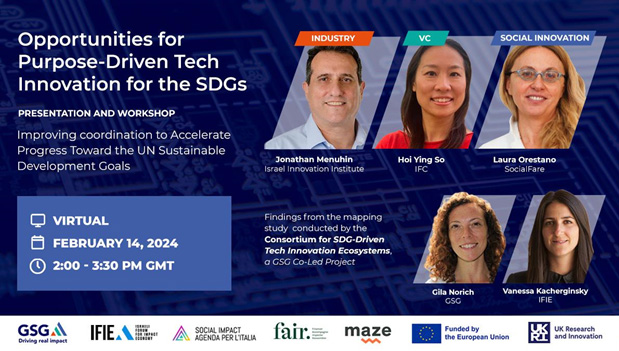
Figure 1 – Speaker card for the webinar, “Opportunities for Purpose-Driven Tech Innovation for the SDGs.”
Jonathan Menuhin CEO of the Israel Innovation Institute delivered a compelling speech addressing the pressing question: What are the pathways for the industry to better harness tech and innovation to tackle the SDGs? Jonathan underscored the market’s failure resulting from a lack of awareness within industries regarding the SDGs, emphasizing the pivotal role of market education and community engagement in addressing this obstacle. He introduced the challenge-centric approach adopted by the Israel Innovation Institute, which empowers entrepreneurs to engage directly with corporations in solving SDG-related challenges.
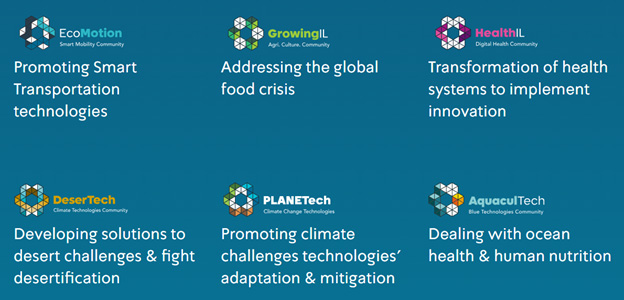
Figure 2 – The Israel Innovation Institute’s international innovation ecosystems based on a challenge-centric approach
Hoi Ying So, Co-Head and Global Portfolio Manager at IFC’s Disruptive Technologies and Venture Capital provided valuable insights addressing the question: How can startups and VCs help meet the social and environmental challenges facing emerging markets? Hoi Ying stressed that for regions such as the Middle East or certain parts of Africa that have historically faced underfunding compared to other regions, the IFC intentionally focuses its efforts on both investing companies directly and supporting venture capital funds and fund managers to support their ability to raise money not only from Development Finance Institutions (DFIs) but also from local institutional investors as well. IFC also screens funds and investments to assess their alignment with the SDGs. In this way, IFC supports the development of venture markets, and SDG-aligned ecosystems more specifically, in emerging markets.
Laura Orestano, CEO of SocialFare in Italy provided a speech about how digital social innovation can be scaled domestically to meet the SDGs. She highlighted that while technology is widely accessible, its utilisation often fails to address key areas of well-being including environmental sustainability, equal opportunities, health, education, material living standards, and job security. Laura emphasised that social innovation goes beyond merely addressing societal challenges; it encompasses fundamental choices regarding how knowledge, policies, and sustainability are made accessible or shape the behaviour of users. This entails embedding and prioritising the right choices from the outset when developing and designing social innovation.
The event included a discussion providing participants with an opportunity to share their experience, thoughts, and perspectives. In response to the first question “Which actors do you find are not sufficiently engaged in SDG-driven tech ecosystems?” 44% of respondents identified industry, followed by government (30%), social innovation actors (16%), and venture capital (9%). During the discussion, one attendee emphasised the role of government, highlighting the exemplary practice of the Indian government in establishing digital public infrastructure to address the financial inclusion challenges faced by street vendors. Solutions such as these help to create an enabling environment for the development of SDG-enabled tech innovation ecosystems.
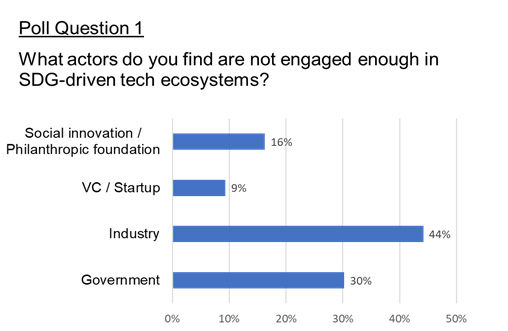
Figure 3 – Poll result of the question “What actors do you find are not engaged enough in SDG-driven tech ecosystems?”
The second question posed was, “Can you think of any unique models of multi-stakeholder collaboration that drive SDG-aligned tech innovation?” Most participants were interested in hearing and learning about what others can share, while 28% indicated they could come up with several collaboration models for SDG-oriented tech innovation. A participant highlighted the effectiveness of government or foundation-led programmes that facilitate partnerships between technology experts and advocates for social change expediting the integration of diverse ecosystems to achieve the SDGs.
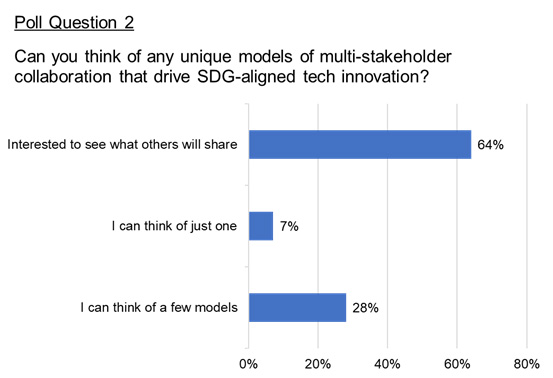
Figure 4 – Poll result of the question “Can you think of any unique models of multi-stakeholder collaboration that drive SDG-aligned tech innovation?”
As we reflect on the remarks and discussions of the webinar, it is evident that collaboration and concerted efforts from various stakeholders are essential for realising the full potential of tech innovation in addressing societal challenges. Looking ahead, the Consortium will remain committed to fostering innovation, collaboration, and knowledge-sharing to accelerate progress towards the SDGs.
You can revisit the webinar by watching the webinar recording and checking the presentation slides of the panellists.
IFIE (Israel NAB)
The Israeli Forum For Impact Economy (IFIE) is proud to share Israel’s first impact investing market sizing study, in collaboration with the tech and venture data and insights company, IVC Data and Insights, and Herzog Fox & Neeman law firm. The report estimates the total impact assets in Israel, alongside the initial assessment of the scope of impact-aligned technological investments. Some of the key findings include the following:
- While there’s a growing Israeli community addressing the SDGs, formal awareness of the SDGs as an investment framework is lacking across sectors.
- Merely 12 out of 23 surveyed impact investors and intermediaries categorize investments according to SDGs. Among those utilizing SDGs, primary objectives include SDGs 3, 9, 8, and 10
- Impact-aligned investments represent 23% of the total capital raised by Israeli tech companies (USD 20 billion out of USD 87.8 billion) between 2017 and the first half of 2023. Sectors such as Life Sciences and Cleantech lead, with 95% and 80% of companies classified as impact-oriented, while numerous other tech sectors also contribute, demonstrating the varied intersections of technology with societal and environmental values.
The broader Israeli SDG-driven tech innovation ecosystem has hosted and will continue to hold lots of exciting events and new programmes for entrepreneurs. For instance, Climate first, an Israeli climate accelerator, has announced the initiation of Cohort III, extending its reach into Europe. It will bring together 10 outstanding Seed and A-stage European Climate Tech companies from diverse verticals and industries.
Similarly, Impact.51, a startup studio dedicated to women’s health innovation, recently hosted its inaugural demo day focusing on projects for menopausal women. Concurrently, ‘Mission Resilience’ persists in entrepreneurial efforts, concentrating on solutions for trauma, PTSD, and anxiety.
On May 21-23, the Biomed Israel 2024 Exhibition, a leading life sciences conference in Israel, will feature the Start-Up Pavilion hosted by the Israel Innovation Authority. The Pavilion will offer a powerful, high-end platform for maximum exposure and business development opportunities, for innovative biotech start-up companies.
Furthermore, amidst the ongoing tensions and instability in Israel, various stakeholders including startup founders, management, and team members, are coming together to support the startup ecosystem. Notably, Iron Nation, an emergency impact fund for Israeli startups, has partnered with prominent high-tech executives, companies, and organisations to help sustain the growth of the most promising Israeli startups throughout and beyond the conflict.
MAZE (Portugal NAB)
In December, maze published a blog – Lessons from the SDG-Driven Tech Innovation Ecosystem – focused on the work done by consortium partners, particularly the Report’s main findings.
The Portuguese Social Security Institute created a new program, Projectos Inovadores (Innovative Projects), to support innovative social solutions in active ageing and elderly independent living. This initiative can foster digital social innovation among organizations from the social sector. It builds on the work of Portugal Social Innovation. The first call for applications is now closed, but it is expected others will open in the upcoming years, focusing on other social issues.
Casa do Impacto – a key player in the Portuguese impact ecosystem – has opened a call for its SDG-focused acceleration program Triggers that encourages new ideas and their transformation into sustainable solutions for solving environmental problems. Triggers support teams that show motivation and know-how for impactful entrepreneurship focused on environmental sustainability. Applications are open until February 11.
On January 25th, Portuguese companies and the public sector participated in the 3rd edition of the Conferência de Negócios Sustentáveis 20 – 30 (Sustainable Businesses Conference 2020-2030), organized by Jornal de Negócios. This year, the conference focused on technology, particularly Artificial Intelligence, to explore the challenges of environmentally sustainable governance.
In addition to the upcoming webinar, our team will continue collaborating with the project partners to disseminate the work done, thereby promoting the development of SDG-aligned Tech Ecosystems in Europe.
FAIR (France NAB)
Following the launch of the SDG-Driven Tech Innovation Ecosystems synthesis report across 7 countries at the GSG Global Impact Summit in Malaga, FAIR published its French ecosystem report in December 2023. The report provides the three following key recommendations to enable the tech innovation ecosystem to align with the SDGs:
- Develop pre-seed and seed funds for companies aligned with the SDGs
- Create an incentivizing regulatory framework
- Promoting a common non-financial evaluation model
Among the key players in the French ecosystem, France Digitale published a practical guide to enable businesses – startups, SMEs and large groups – to quickly understand the issues at stake in the European AI Act and anticipate the next steps in bringing their AI systems into compliance. Furthermore, they released their visionary manifesto for the 2024 European elections, outlining a robust plan for a competitive, innovative, and sustainable Europe.
Moreover, in February, Mouvement Impact France, along with other leading impact experts such as La French Tech, launched the Impact Lab to create impact unicorns, which aims to support around a hundred public and private players in business creation and development each year, thereby helping to raise the skills of the entire economic world and to bring about urgent prioritisation of these issues.
The ecosystem looks forward to ChangeNOW 2024, a 3-day event held between 25-27 March, bringing together the world’s innovative minds and sustainability leaders invested in the deployment of solutions for the planet. Several relevant events are envisioned at ChangeNOW such as FDTour, a tour of Paris’ impact tech ecosystem, hosted by France Digitale.
Social Impact Agenda per l’Italia (SIA) (Italy NAB)
As the Agenda2030 deadline is coming closer, the Italian innovation ecosystem is teeming with a variety of partners to take part in a set of initiatives aimed at tackling the challenges ahead while fully leveraging opportunities presented in the National Recovery and Resilience Plan.
Italy’s SDG-Driven Innovation Ecosystem embarked on a dynamic journey. In January, the Italian G7 Presidency kicked off with a strong emphasis on the geopolitical relations within the Mediterranean area and the African continent. Sustainable development ranks high on the G7 political agenda alongside the imperative for a new model of collaboration with the Global South. SIA, in collaboration with the GSG, is actively advocating for impact investing to feature prominently on the G7 agenda, building upon insights from the Impact Taskforce (ITF) State of Play 2023. Stay tuned for updates in the coming months!
Furthermore, the Finance for Impact: 2023 Italian Outlook. The Journey to Radicality report was unveiled early in the year, developed by TIRESIA Polimi in collaboration with SIA and supported by Impact Europe. The Outlook reveals that Italy’s impact finance has been growing from almost €7 billion in 2021 to €9.279 billion in 2022. Notably, it identifies the following Sustainable Development Goals as attracting the most investment from Italian impact investors: SDG 3 – Health and well-being, SDG 9 – Decent work and economic growth, SDG 10 – Reduction of inequalities, SDG 11 – Sustainable cities and communities, and SDG 12 – Responsible consumption.
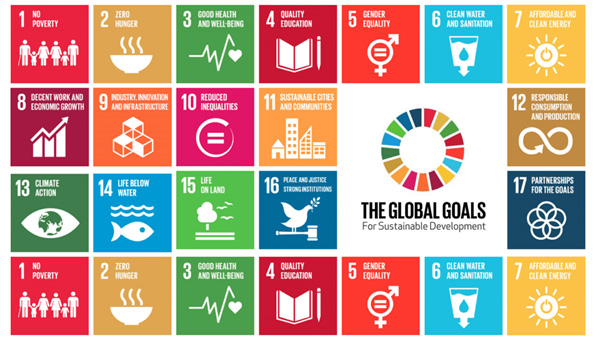
Figure 5 – The United Nations 17 Sustainable Development Goals
On February 13th, a webinar, The Monetization of Impacts: The Role of IFVI and the ‘Impact-Weighted Accounts’ Approach by HBS was organized by SIA and Organismo Italiano di Business Reporting (O.I.B.R.), in collaboration with the GSG, International Foundation for Valuing Impacts (IFVI), the Impact-Weighted Accounts Project of the Harvard Business School where Sir Ronald Cohen, President of the GSG, was presented as a speaker.
The highly anticipated Consortium webinar “Opportunities for purpose-driven innovation for the SDGs,” featured a voice from SocialFare, the Italian Centre for Social Innovation, presenting a model of interest for European start-up incubators, accelerators, and impact investors.
“Renewable Energy Communities (CER) and Impact Investing” marked the launch of a new research and advocacy initiative by SIA aimed at exploring how community-led models could facilitate the green and just transition in Italian territories, with a particular focus on impact finance instruments. The inaugural “Impact-driven CER” webinar is slated for February 20th.
Last, but not least, on the 4th of March, Rome hosted “IMPACT NOW. Another Capitalism is Possible” organized by Human Foundation in collaboration with SIA and the GSG. The Conference gathered the European impact revolution leaders together with major actors from the impact investing ecosystem, under a shared vision: the urgent need to advance the impact economy and to bring values and goals of environmental sustainability, social solidarity, gender, and intergenerational justice at the core of financial activities.
Following the Conference, on the 5th of March, SIA hosted a meeting with GSG-affiliated European National Advisory Boards (NABs) to address impact investing-related challenges and opportunities at the EU level, aiming to present a unified voice and continue championing SDG-driven innovation tech ecosystems at the EU level.
SDG NEWSLETTER – OCTOBER 2023
We are excited to announce the successful launch of the SDG-driven Tech Innovation Ecosystems consortium project and its mapping study at the GSG Global Impact Summit 2023, where over 1000 impact leaders from 60+ countries gathered together in Malaga, Spain on October 2-3, 2023.
During the Summit, we organized a total of 2 panel sessions and 1 workshop dedicated to the consortium project looking at the different facets of SDG-driven tech innovation ecosystems:
- SDG-Driven Tech Innovation Ecosystems to Accelerate Progress Toward the SDGs, where the consortium partners presented the mapping study and facilitated the panel discussion.
- Tech-Innovation: Perspectives from Diverse Ecosystems and Geographies, where distinguished guest speakers provided insights into SDG tech innovation ecosystems from various regions (see IFIE’s newsletter section for more information.)
- Workshop: Collaborating to strengthen impact-tech ecosystems in service of the SDGs, where consortium partners led roundtable discussions with Summit participants on specific topics (see MAZE’s newsletter section for more information.)
The launched mapping study delves into the policies, initiatives, actors, and resources shaping the local ecosystem in France, Israel, Italy, Portugal, and 3 CEE countries (Lithuania, Estonia, and Poland). Its goal is to identify the key strengths and barriers in their respective ecosystems, with a view to sharing and building best practices.
The study introduces the SDG-driven Tech Innovation Ecosystems Building Blocks Framework, outlining the essential features that can accelerate the SDGs implementation. Key findings reveal that approximately 19,000 startups and digital innovation solutions across seven countries, but the SDGs are not clearly articulated in public-facing language by national governments despite being referenced in EU documents.
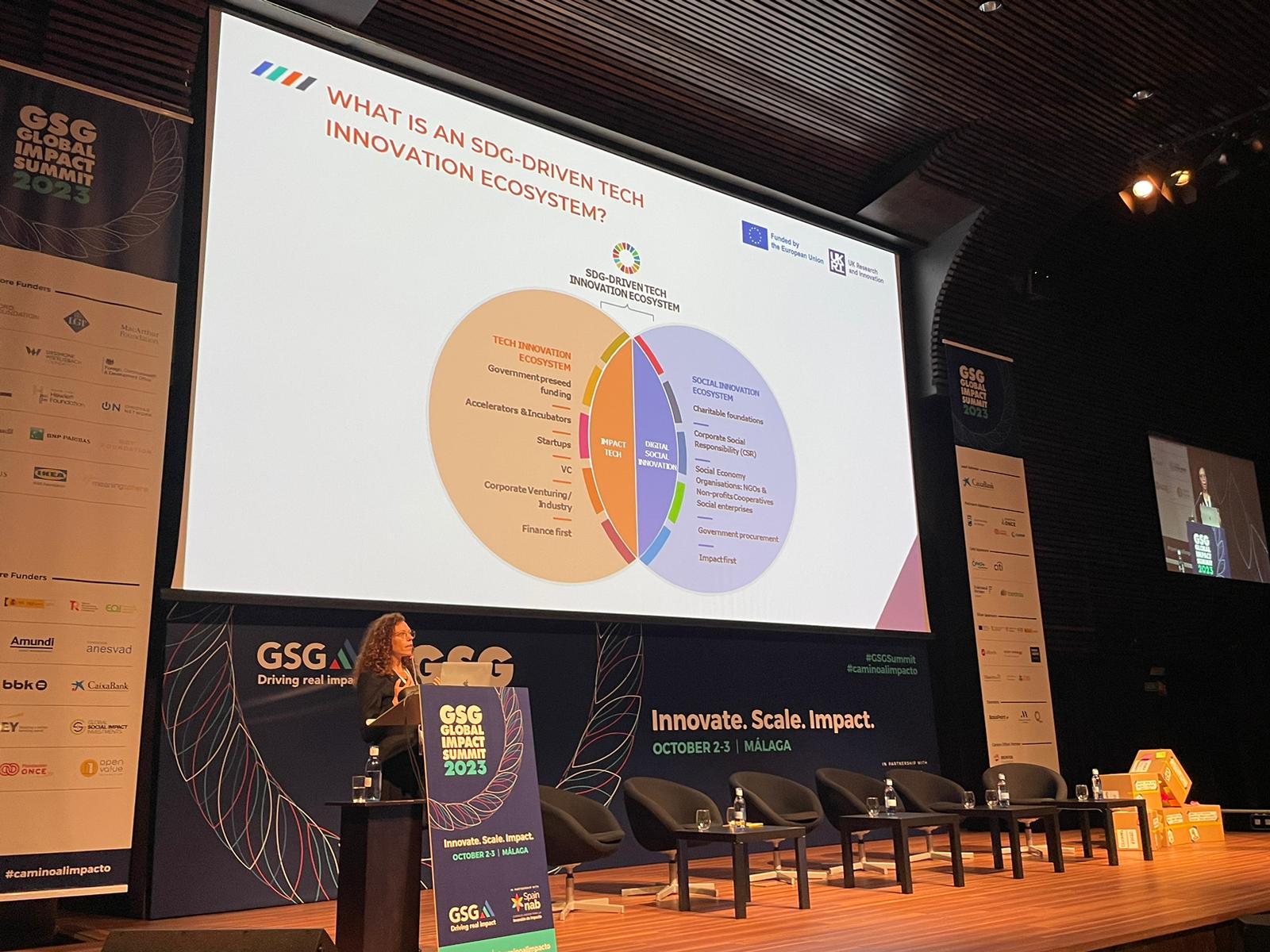
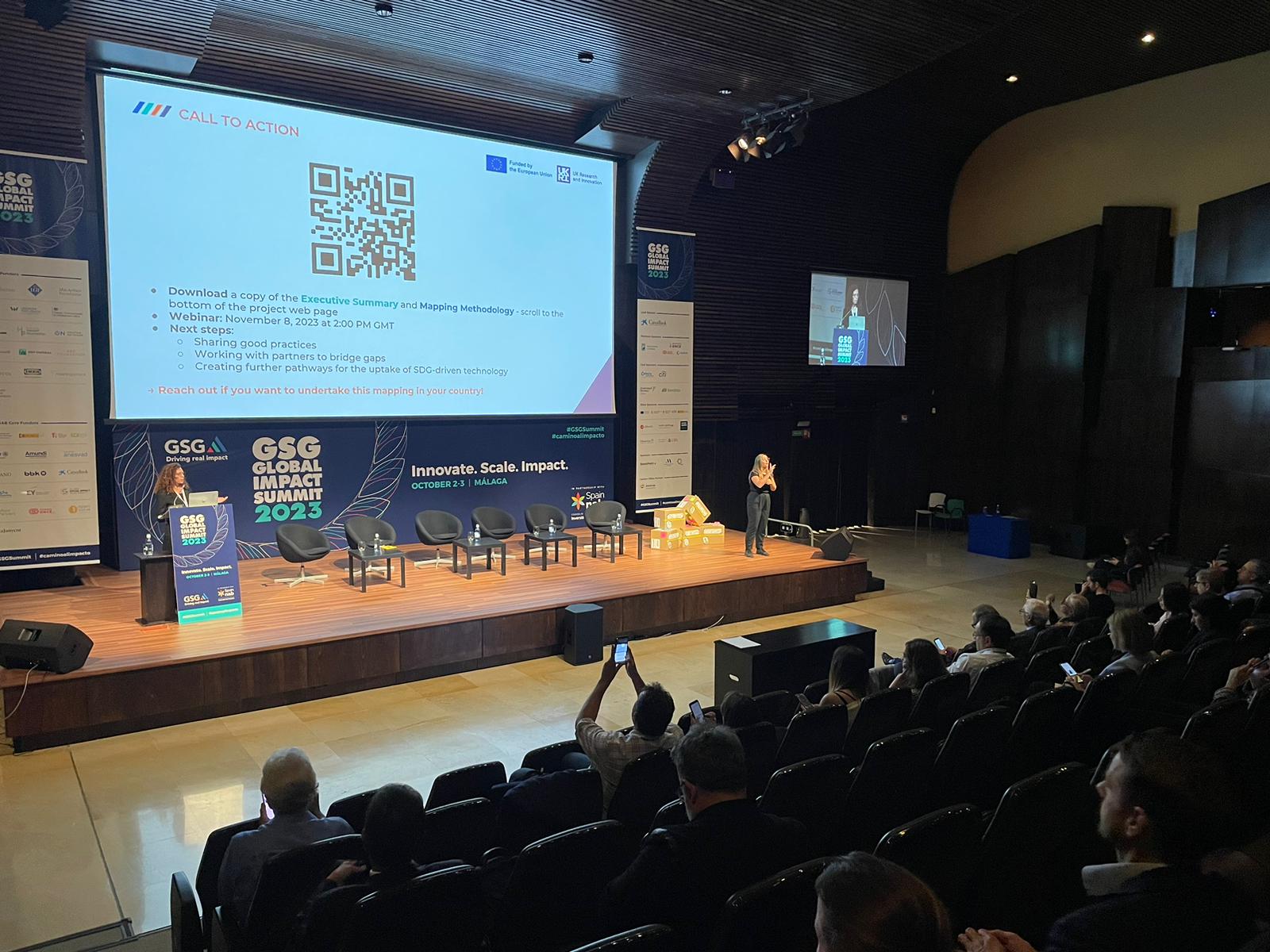
Figure 1 – Gila Norich, Head of Knowledge Development at GSG, presenting the mapping study at the launch session, SDG-Driven Tech Innovation Ecosystems to Accelerate Progress Toward the SDGs, at the GSG Global Impact Summit 2023. Presentation slides are available here.
The launch session commenced with a presentation by Vanessa Kacherginsky from IFIE, highlighting the ‘technology-impact-capital’ triangular mechanism supported by the network facilitation and the significance of our consortium project in developing a roadmap for the creation of next-generation innovation ecosystems catalyzed by technology.
The session featured a panel discussion with ecosystem representatives featured in the mapping study from Israel, Portugal, France, Italy and Lithuania. Moderated by Omri Boral from IMagine IMpact, the panel addressed the opportunities and challenges in scaling impact through technology and strategies to accelerate funding and alignment with SDG-related challenges and solutions, particularly in the context of limited impact investment in technology.
Highlights from the panel included:
- Vanessa Kacherginsky from IFIE (Israel) stressed the need for government and investors to collaboratively identify and address needs and challenges while tailoring solutions for maximum impact.
- Greta Monstavice from Katalista Ventures (Lithuania) observed that environment-focused tech solutions notably exhibit more growth, given that countries, especially in the Global North, face similar environmental challenges, from her acceleration experience of impact startups.
- Margarida Anselmo from MAZE (Portugal) underlined the increasing presence of SDGs and technology in top universities in Portugal.
- Martina Mettgenberg from FAIR (France) noted that the French ecosystem benefits significantly from government initiatives and regulations, exemplified by the 90/10 funds that require a 10 percent investment into social organisations and enterprises.
- Filippo Montesi from SIA (Italy) urged to rethink how technology is developed, stressing that a mere focus on increasing investment is insufficient and could result in the deterioration of societal equality through technology development.
The session closed with a remark by Sir Ronald Cohen, President of GSG, emphasizing the pivotal role of government incentives in shaping the transformative potential of businesses that incorporate social impact into their business models. As one of the pioneers of both the venture capital and impact investing industries, having Cohen speak at the official launch event presented a distinctive opportunity to bridge the realms of commercial tech investing and the imperative for venture capitalists to increase their commitments to impact investments.
“Entrepreneurs are the actors who will drive the impact revolution and bring disruptive models to the forefront of sustainable development,” said Cohen.
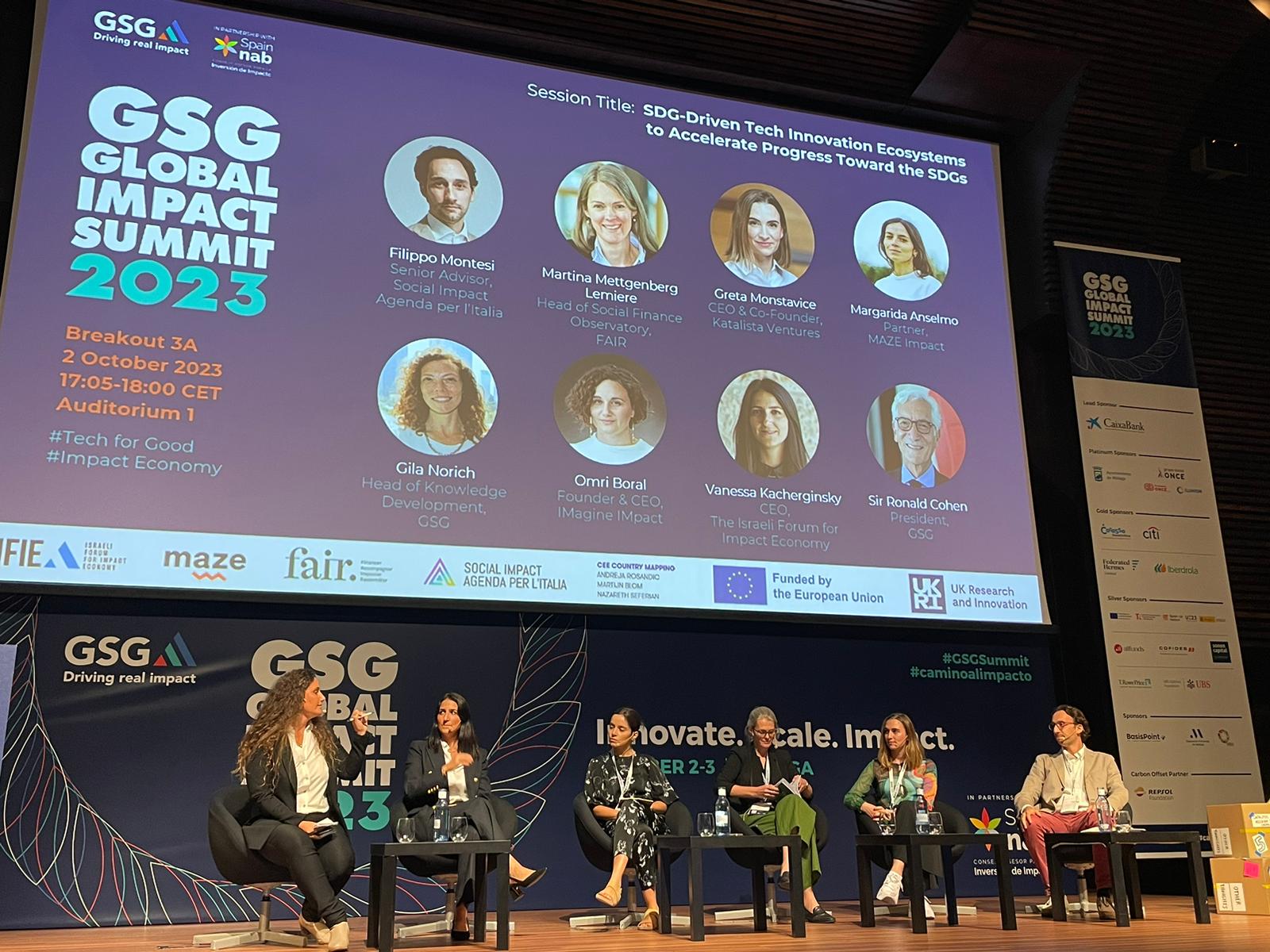
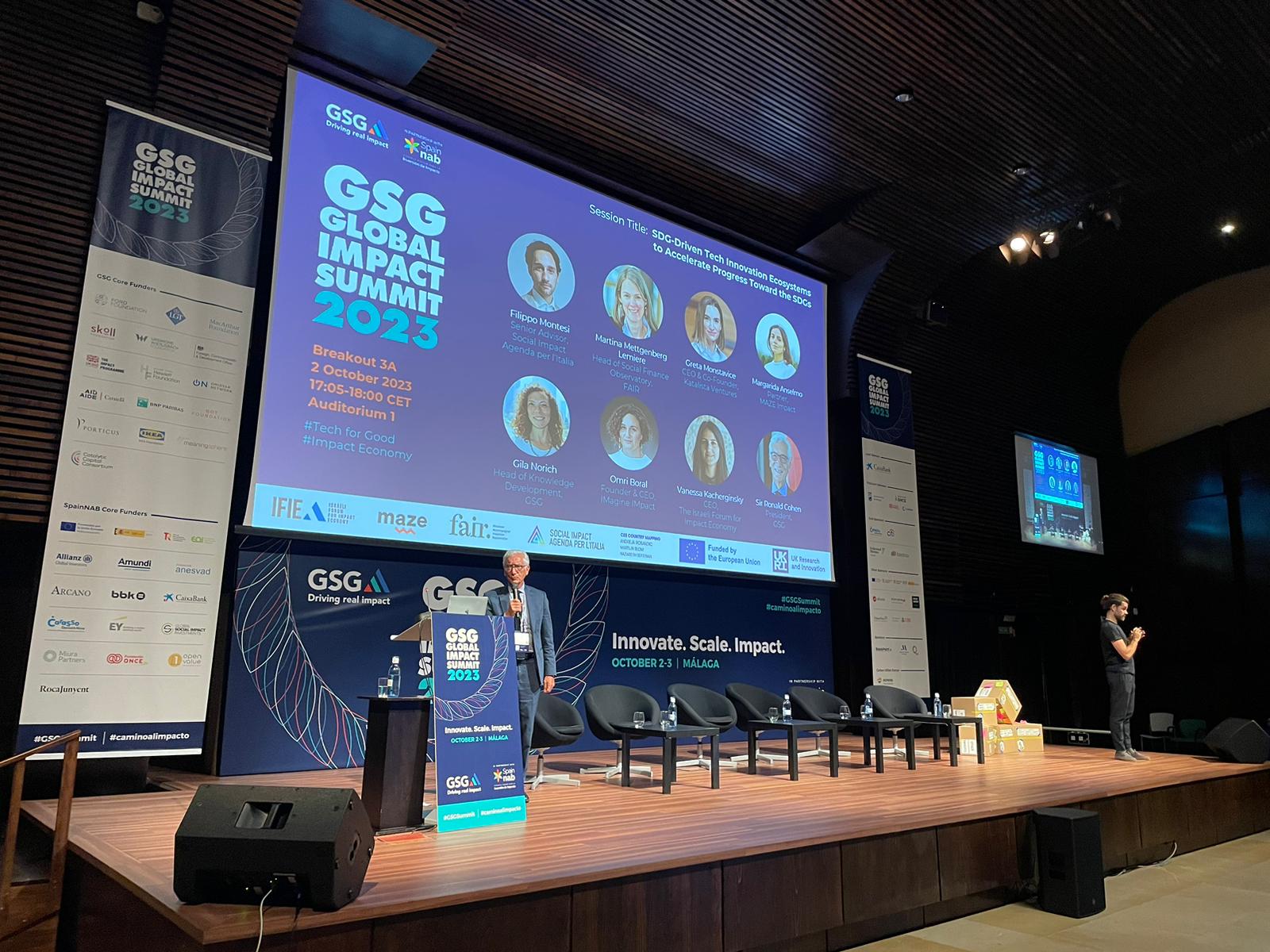
Figure 2 – Panel discussion as part of a launch session, SDG-Driven Tech Innovation Ecosystems to Accelerate Progress Toward the SDGs (Left); and Sir Ronald Cohen delivering a closing remark (Right) at the GSG Global Impact Summit 2023.
More details of each ecosystem’s landscapes are available in the Executive Summary.
IFIE (Israel NAB)
In preparation for the GSG Global Impact Summit 2023, IFIE organised and facilitated a panel discussion looking at the SDG tech ecosystem in diverse regions. During the summit, the panel session, Tech-Innovation: Insights from Varied Ecosystems and Geographies, explored the role of innovative technology in advancing sustainable impact across Southeast Asia, Sub-Saharan Africa, Israel, and the EU countries with the respective speakers.
As a moderator, Stav-Bar Shanny, Director at ATBN/AfriConEU, moderated a conversation about how governments and NGOs support the SDG tech ecosystem and what is the role of impact investors in promoting innovation.
Jonathan Menuhin, CEO of Israel Innovation Institute, represented the Israel ecosystem and shared his insights into operating six innovation communities specialising in specific technologies, collaborating with the Israeli government to bridge the gap between the demand for innovation and the current supply chain. The Israel Innovation Institute is one of the best practices case studies featured in our SDG Mapping Study, as a good example of a Market Facilitator in SDG-driven tech innovation ecosystems.
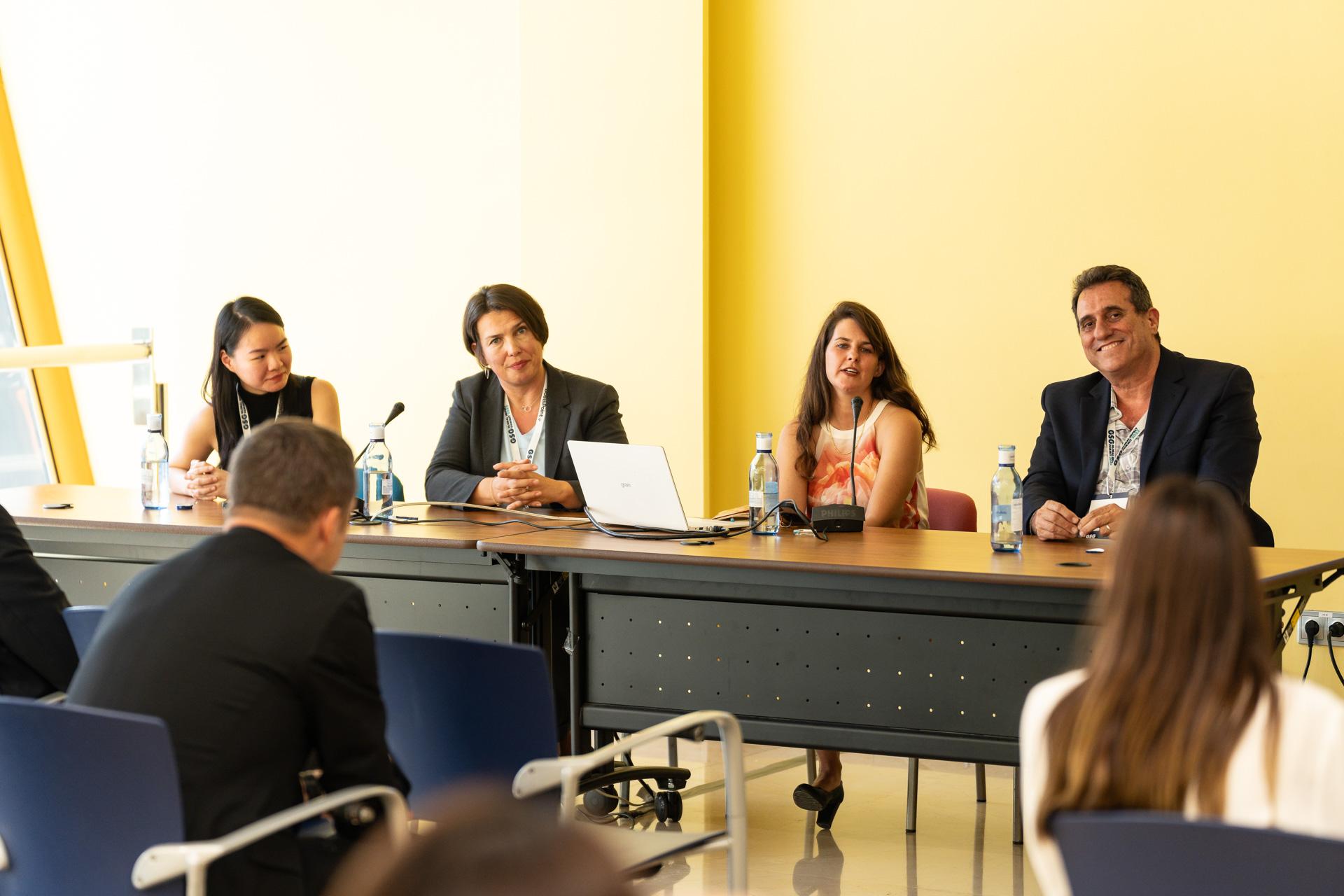
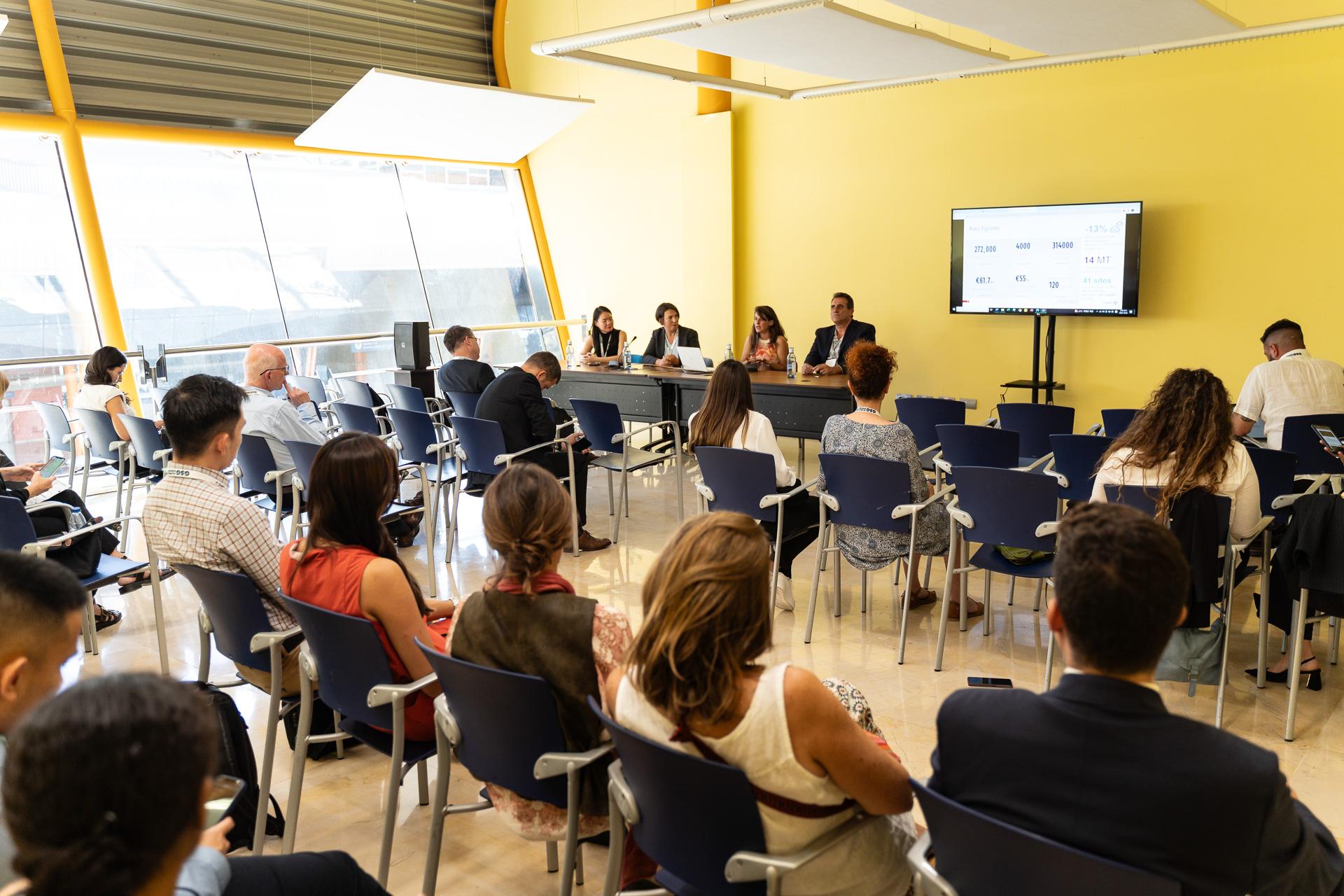
Figure 3 – Panel discussion titled “Tech-Innovation: Perspectives from Diverse Ecosystems and Geographies” during the GSG Global Impact Summit 2023.
MAZE (Portugal NAB)
Activity Update
The focus of MAZE’s work over the last few months has been on collaborating with the project partners to structure, organize, and deliver the project launch session and workshop at the GSG Global Impact Summit 2023 in Malaga.
Maze has collaborated with Omri Boral from IMagine IMpact in structuring and facilitating a 1-hour workshop on the theme of Collaborating to strengthen impact-tech ecosystems in service of the SDGs. The workshop gathered more than 30 participants and enabled roundtable discussions covering best practices, challenges and needs focused on specific topics on the different ways in which technology and innovation can be used to strengthen and advance impact economies. The discussion topics included:
- Impact-tech: startups generating profits & impact through tech innovation
- Digital solutions to scale efficiency of NGOs & public organizations
- Tech training & employment as a tool to drive social and economic mobility
- Investment models driving tech for impact
- Catalytic capital in the mission to implement Impact tech
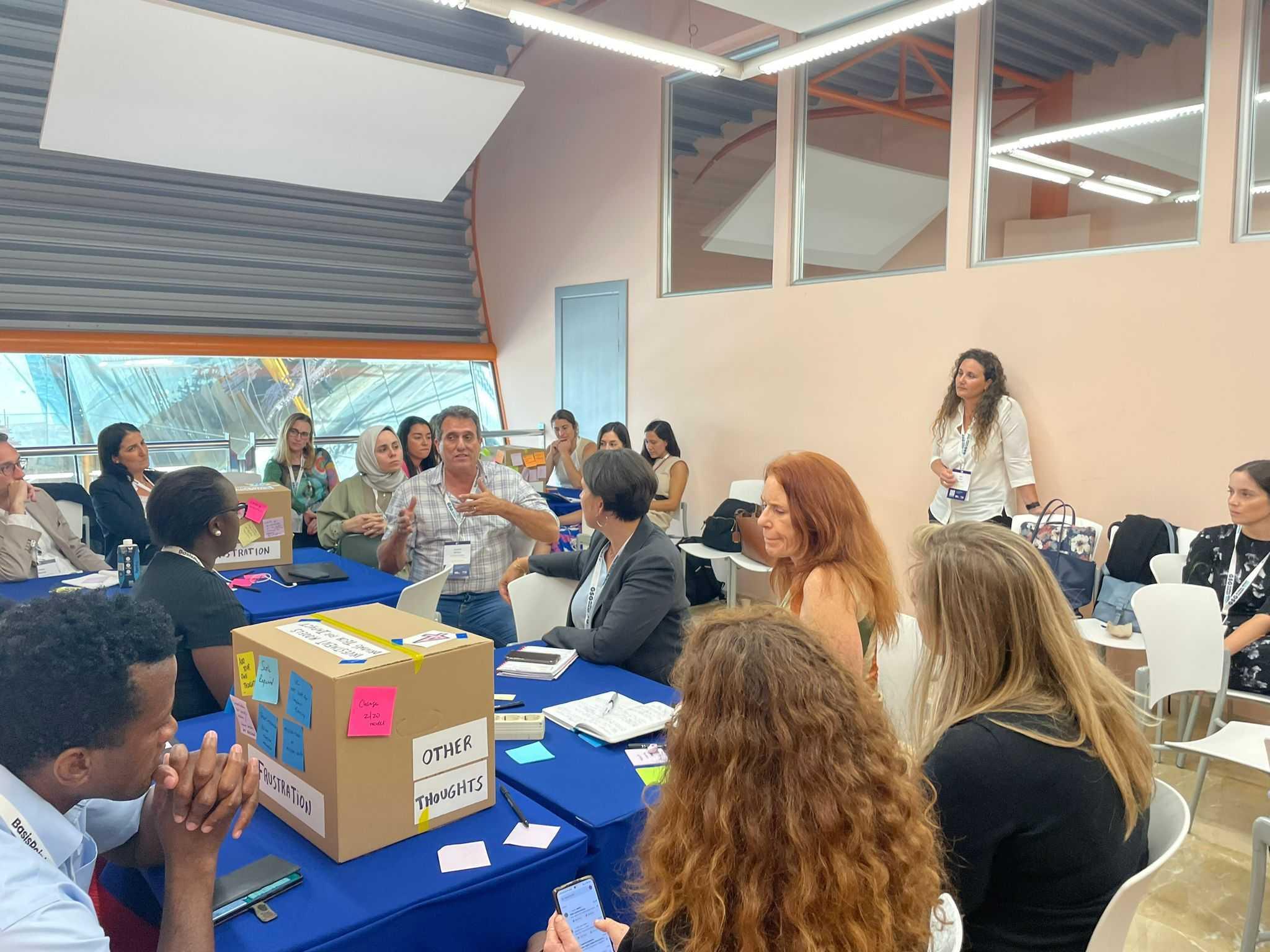
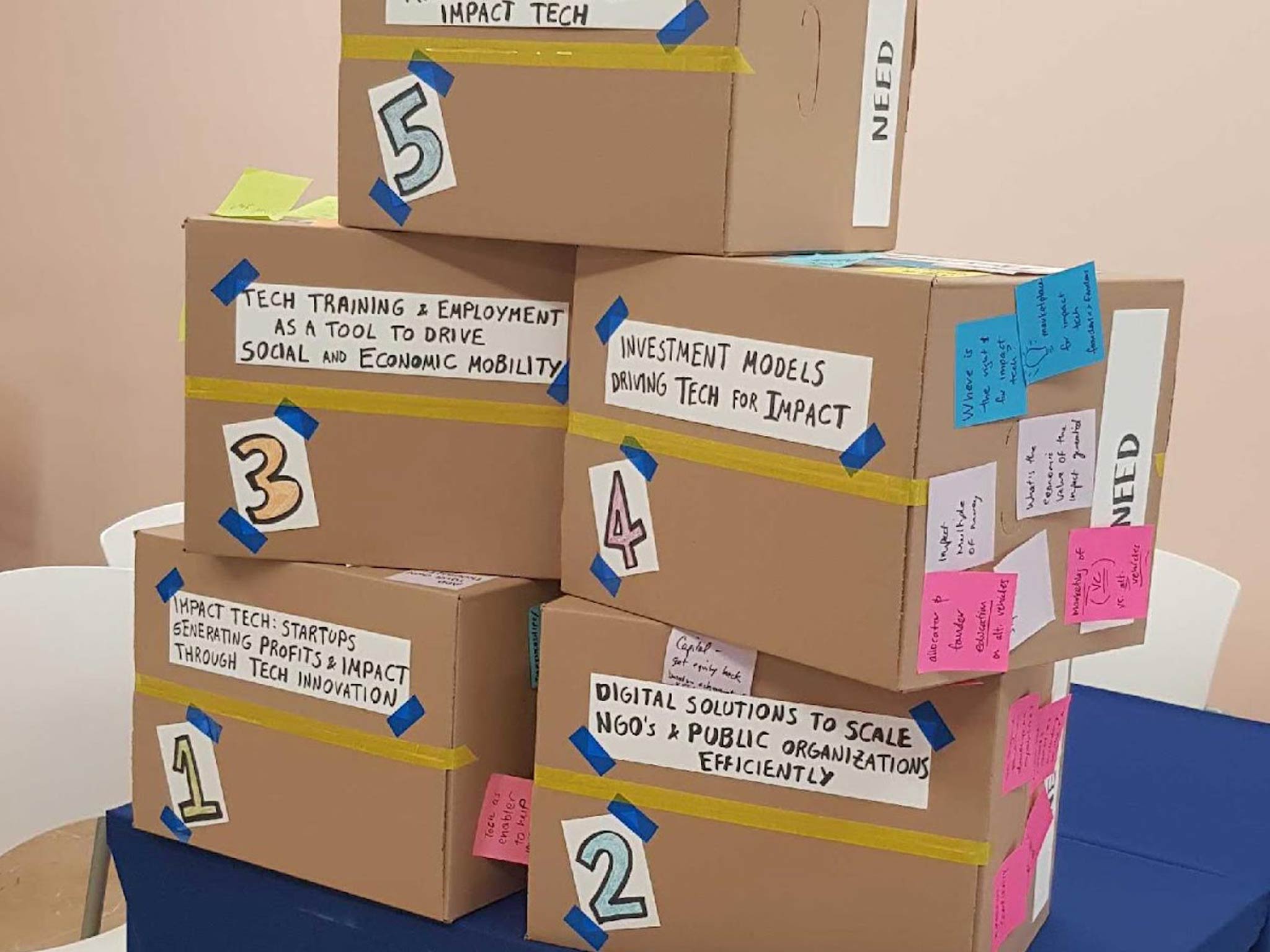
Figure 4 – The consortium partners-led workshop, Collaborating to strengthen impact-tech ecosystems in service of the SDGs, at the GSG Global Impact Summit 2023.
SDG-related news from the Portuguese Ecosystem
At the end of September, the Global Enabling Sustainability Initiative (GeSI) hosted the Digital With Purpose Global Summit 2023 in Lisbon. DWP has a mission to put innovation and digital solutions at the core of the digital agenda to prove that digital is key to tackling the most pressing sustainable challenges. This event brings together companies, public entities, and central and local governments, to showcase the benefits of digital and sustainable solutions.
Blue Bio Value Ideation was launched this week, on October 16th. This 5-week programme aims to support innovative R&D projects that sustainably use marine bioresources. With the guidance of business mentors, participants will be equipped to address technology transfer challenges and empowered to transform blue biotechnology research into viable projects. The program is promoted by the Oceano Azul Foundation and the Calouste Gulbenkian Foundation and is implemented by Maze Impact.
Web Summit will be back in Lisbon in November. This annual 3-day event brings together 70,000+ people from 160+ nationalities, 2,300+ startups, and 1,000+ speakers. In this event, policymakers, heads of state, startup founders, and CEOs of technology companies will discuss new paths for redefining the tech industry. This event is not SDG at its core. However, sustainability topics will be at the centre of its agenda.
Next Steps / Plans
In the upcoming months, Maze Impact will continue to collaborate with the consortium partners to disseminate the report and associated outputs and to promote the development of SDG-driven Tech Ecosystems in Europe.
FAIR (France NAB)
The French ecosystem has been bustling with a series of impactful events since June 2023. Notably, France Digitale organized its annual gathering of the tech ecosystem in Paris, while Mouvement Impact France UEED convened on August 30 under the theme of ‘Towards an economy of peace’.
LinkedIn’s list of the 20 most promising start-ups reveals that nearly 30% of them are focused on social and green initiatives, including companies like green-got, moka-care, sweep, Verkor, greenly, and umiami. Furthermore, in terms of the number of investment deals over the last three years, Charlie Perreau from Les Echos used Pitchbook to identify the most active investors: BPI France (607), Kima Ventures (271), Super Capital (105), AngelSquare (92) and Founders Future (75).
Beyond these recent developments, several noteworthy events hosted by impact tech leader organizations in the French ecosystem are on the horizon as follows:
- French Tech’s 10-Year Anniversary, 16-22 October
- Impact Day hosted by France Digitale, 23 November
- Imagine Summit – l’innovation verteuse hosted by Le Poool et La French Tech Saint Malo Rennes, 7 Dec 2023
Social Impact Agenda per l’Italia (SIA) (Italy NAB)
In recent weeks, the momentum of Sustainable Development Goals (SDGs) has surged within the Italian ecosystem. On October 17, SIA and ET Group co-organized an event titled, “ESG-branded Impact – Market, rules and frontiers of impact investing in Italy” as part of Salone.SRI 2023 Rome, a major national event on socially responsible investments in Italy.
The event was an opportunity for the NAB to share the main highlights from the GSG Global Impact Summit 2023 in Malaga, with an eye toward the upcoming 2024 Italian G7 Presidency. At the opening, Giovanna Melandri, President of SIA and GSG Ambassador, launched an urgent call to attract private investments aimed at bridging the estimated $3.7 trillion annual gap in SDG financing.
Moreover, the event featured insights from the Impact Investing Outlook 2023, an Italian market sizing study led by Tiresia–Polimi, a research center based in the School of Management of the Polytechnic University of Milan, in collaboration with SIA and EVPA. This study highlighted areas where impact investments are more prominent, particularly within SDG 1 and SDG 8.
Event attendees, including representatives from the financial and institutional funds ecosystem as well as from the EU and national policymaking arena, presented their commitment and ongoing initiatives while highlighting priorities and constraints.
Key discussions revolved around the necessity for the Italian impact investment ecosystem to focus on key developments such as enhancing open data availability, supporting SMEs, and promoting engagement at all levels. These actions are essential to accelerate progress and bridge the significant gap in achieving SDG-related targets.
In fact, according to the recently published “Italy and the Sustainable Development Goals” by ASviS (Italian Alliance for the Sustainable Development), the progress of the 2030 Agenda in Italy – and even beyond – faces significant delay. At the current pace, it is estimated that full achievement may only be reached for 8 out of the 33 SDG-related targets. Nevertheless, the report underscores that urgent measures and policy reforms can help to partially catch up.
To actively encourage and guide the financial and social innovation ecosystem in the adoption and implementation of SDGs-oriented approaches and practices across all levels, SIA reaffirms its unwavering commitment. Highlights and practices learnt from the GSG Global Impact Summit 2023 will be of great inspiration and support to the Italian ecosystem.
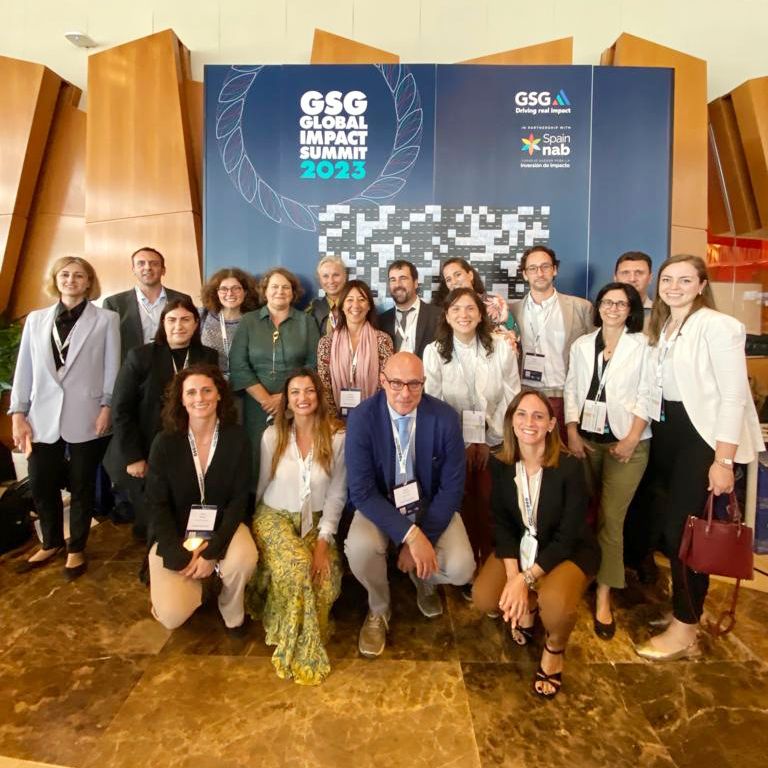
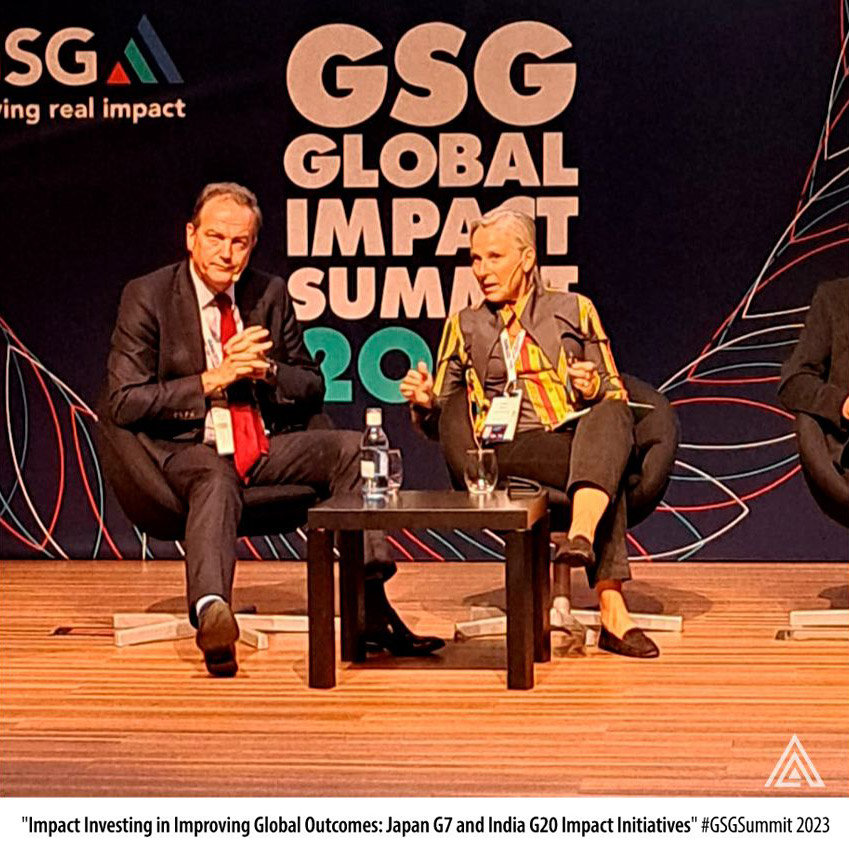
Figure 5 – Italian ecosystem delegation (Left); and Giovanna Melandri, President of SIA and GSG Ambassador speaking (Right) at the GSG Global Impact Summit 2023.
In particular, the SDG-driven Tech Innovation Ecosystem Building Blocks Framework, presented in Malaga will be at the very centre of the SIA coming months’ agenda. In this regard, our national agenda of workshops is currently under construction to present the Framework to a variety of communities and local ecosystems in Italy.
PROJECT PARTNERS & SPONSORS




The consortium’s work is generously supported by a grant from the European Commission through its Horizon 2021-2027 European Innovation Ecosystems (EIE) initiative.
DISCLAIMER
Funded by the European Union. Views and opinions expressed are however those of the author(s) only and do not necessarily reflect those of the European Union or [name of the granting authority]. Neither the European Union nor the granting authority can be held responsible for them.
SDG NEWSLETTER – JUNE 2023
We are delighted to share the latest updates on our consortium project for the SDG-driven tech innovation ecosystem. Our collective efforts have achieved significant milestones in recent months, propelling us closer to our shared goals.
In May, ahead of the GLM, we released a new instalment of SDG-Tech News. A series of three Three new and insightful blogs explore municipal-level initiatives for SDG-driven tech innovation, frameworks for impact startups and VC investors, and useful resources on policy-led innovation. The blogs draw examples and inspiration from the findings and insights presented in our synthesis report (forthcoming in October 2023).
Later in the month, consortium partners gathered in Istanbul for the highly anticipated GSG Leadership Meeting (GLM). One day prior, the Consortium held an in-person Partner Meeting. The Meeting provided an in-depth opportunity for Partners to share the identified key strengths and challenges of each ecosystem, including Portugal, Italy, France, and Israel and discussed how to develop the conceptual framework and new methodology for capturing SDG-driven tech innovation ecosystems.
Another event highlight was the NAB learning festival, with a session on SDG-driven tech innovation facilitated by IFIE (Israel NAB) and MAZE (Portugal NAB). This session provided a platform to share findings from our project with other participants, fostering collaboration and inspiring new ideas. The learning festival underscores our commitment to knowledge exchange and collective growth within the Consortium.

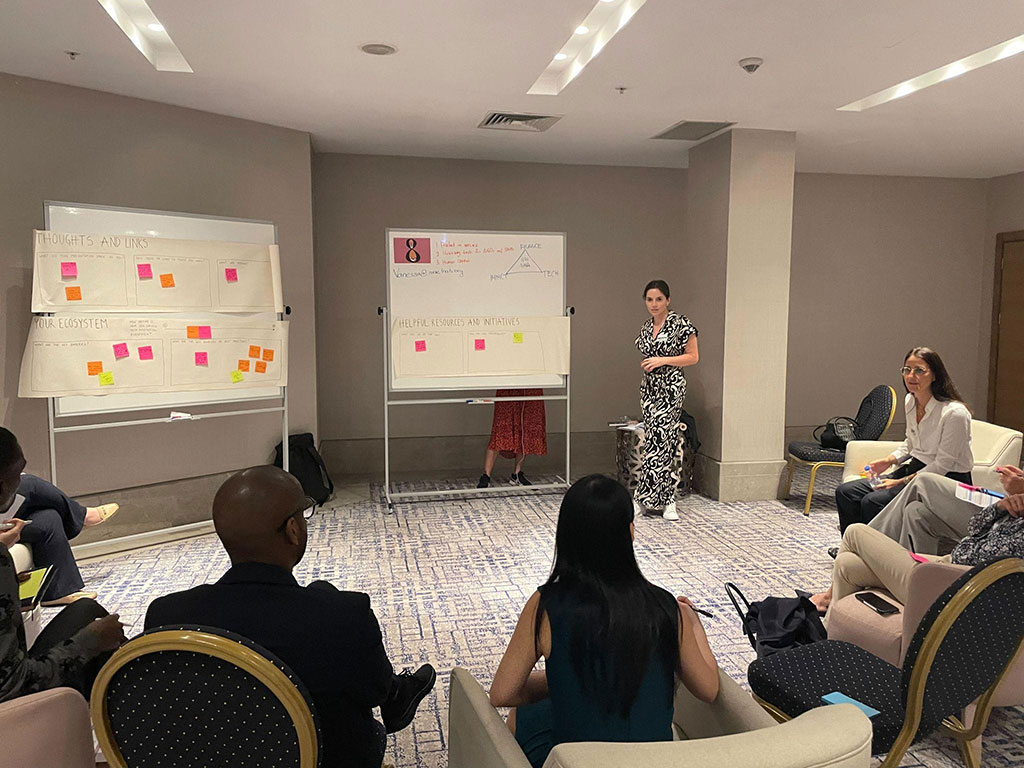
Figure 1 – IFIE and MAZE introducing the Consortium at the 2023 GSG Leadership Meeting, held between May 30th and June 1st in Istanbul.
With each milestone achieved and every collaborative effort made, our consortium project continues to gain momentum. Stay tuned for more exciting updates as we progress towards our shared vision of a tech-driven sustainable future.
IFIE (Israel NAB)
The consortium partner meeting of the SDG-driven tech innovation ecosystem, held during the GSG Leadership Meeting in Istanbul, was an extraordinary gathering that is already making a lasting impact.
As the creators of this project, we found ourselves venturing into uncharted territory as we sought to translate our research into concrete actionable steps that could make a difference across different ecosystems and countries. The discussions among consortium members centered around this goal, exploring how we could effectively implement our findings. At the meeting, IFIE presented two frameworks that have started to take shape for the Israeli case based on the research:
- A Triangle model connecting Finance, Technology and Impact, where ecosystem builders (essentially the NABs) are situated in the middle as market, network or ecosystem facilitators, in line with the role outlined in our forthcoming Building Blocks Framework for Building SDG-Tech Driven Innovation Ecosystems.
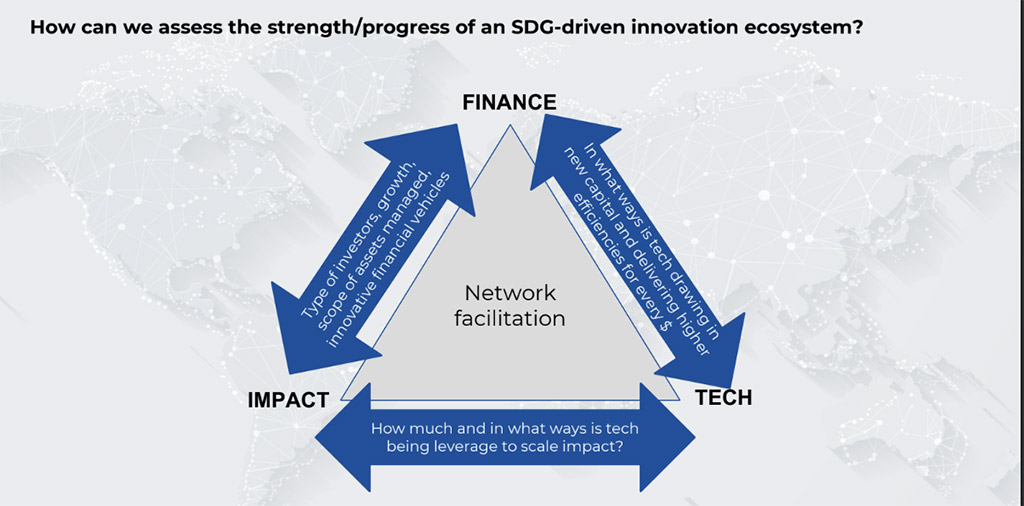
Figure 2 – A Triangle Model describing the role of NABs in facilitating SDG-driven innovation ecosystems, proposed by IFIE.
- Identifying three types of “Impact Tech” or “Tech for the SDGs.” – What use-cases are we seeing for understanding the importance of SDG-driven innovation ecosystems?
- Products and Services – Innovative tech solutions addressing SDG challenges, generating profits and impact.
- Data and Performance Management for non-profits, non governmental organisations (NGOs), social economy organisations, public entities- Digital solutions to scale and drive the efficiency of these actors and stakeholders
- Training and skills development for under-represented groups within the tech sector – Access to Science, Technology, Engineering, Maths (STEM) training and job placements enabling opportunties for sustainable, quality employment and social and economic mobility.
As a next step, the release of Building Blocks Framework and Synthesis Report will facilitate the identification of best practices, enable the modularisation of these practices into a toolkit, and a set of “Tech for the SDGs” applications and affiliated stakeholders. The aim is to introduce this framework to fellow NABs and market builders, thereby enhancing SDG-driven innovation ecosystems on a global scale.
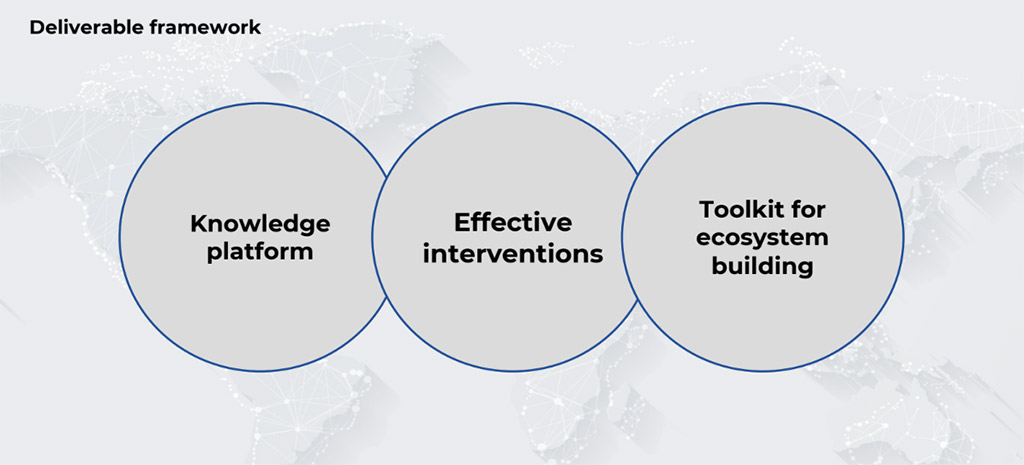 Figure 3 – The SDG-Driven Tech Innovation Consortium Deliverables Framework
Figure 3 – The SDG-Driven Tech Innovation Consortium Deliverables Framework
Following the consortium meeting, we engaged during the GSG leadership meeting in different sessions with other stakeholders and NABs to get their feedback. These frameworks the discussion aroused significant interest among the different NABs and NAB Taskforces, as well as a strong willingness to strategically integrate the ‘SDG Impact Tech’ approach.
We look forward to taking our project to the next level at the GSG summit in Malaga to be able to showcase the work we’ve accomplished so far to a wideraudience and to establish the SDG Impact Tech as a main vertical in the impact movement led by the GSG and NABs.
MAZE (Portugal NAB)
As part of the official agenda for the 2023 GSG Leadership Meeting (GLM), MAZE was invited by the GSG to combine efforts with the Israeli Forum for Impact Economy (IFIE) to facilitate a session on Building Technology Ecosystems to Achieve the SDGs.
The goals of the session included:
- Sharing some of the intentions and insights that have resulted from our project so far;
- Encouraging the engagement of other Impact Investment National Advisory Boards with the topic; and
- Collecting insights from the participants regarding best practices, needs, and proposals.
The team ran three back-to-back identical sessions with a small number of participants, which helped to enable engaging discussions and resulted in a number of relevant ideas as well as an understanding that there is an appetite for the topic of better understanding SDG-focused tech innovation within and beyond European ecosystems.
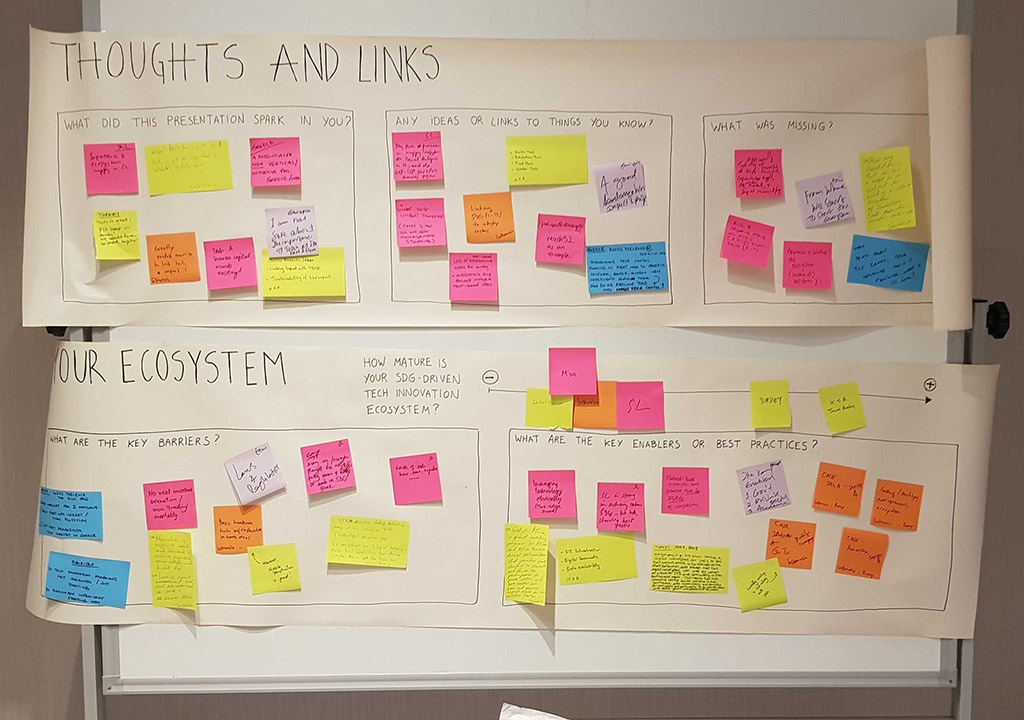 Figure 4 – Two of the boards used to collect contributions from participants during the learning festival session on Building Technology Ecosystems to Achieve the SDGs that took place as part of the official agenda for the 2023 GSG Leadership Meeting, held between May 30th and June 1st in Istanbul.
Figure 4 – Two of the boards used to collect contributions from participants during the learning festival session on Building Technology Ecosystems to Achieve the SDGs that took place as part of the official agenda for the 2023 GSG Leadership Meeting, held between May 30th and June 1st in Istanbul.
The Oceano Azul Foundation and the Calouste Gulbenkian Foundation are set to launch the 6th edition of the Blue Bio Value acceleration program in September. This 10-week program aims to accelerate startups operating in the blue biotechnology sector, specifically in the marine bioresources chain, to promote a global and sustainable blue bioeconomy. Applications closed on June 12th, and the selected cohort will be announced during the summer.
Five years after the 1st edition, the 2nd edition of Aldeia da Inovação Social took place from June 20th to June 21st in Alentejo, Portugal. Portugal Social Innovation is the promoter of the event. The programme includes 130 speakers, 10 workshops, and multiple activities. Despite the event not focusing on tech, it will bring together key players from the Portuguese social innovation ecosystem across sectors (public, private, and social) to discuss relevant topics and further develop the ecosystem. The goal is to strengthen Portugal’s position as a global innovation leader.
BCSD and Grace, prominent associations that put together stakeholders in the Portuguese social economy, have been taking the lead in promoting the SDG agenda, particularly in the corporate realm. In June, they hosted a Masterclass dedicated to the SDGs. This masterclass explored integrating the SDGs into management practices, covering the framework, best practices for reporting and communication, and relevant tools. It is part of a series of initiatives aimed at raising awareness and fostering SDG adoption.
Next Steps / Plans
In the next months, MAZE will continue to collaborate toward the successful completion of the written outputs of this project, as well as the design of future initiatives that could be relevant to promote the development of SDG-aligned Tech Ecosystems in Europe. In the short term, the priority will be to discuss how best to take advantage of the GSG Global Impact Summit in Málaga to launch the final State of Play Report.
Social Impact Per L’Italia (Italy NAB)
The Italian innovation community has been organising and participating in engagement workshops and thematic conversations throughout the country, generating significant interest in the topic.
During our national engagement workshop “Creating next-gen innovation ecosystems catalysing digital social innovation and Technology to address global challenges,” held in February 2023 by Sapienza University in Rome, we identified seven key areas to build up a sound SDG-driven tech innovation ecosystem in Italy as follows:
- training and capacity building as a top priority to facilitate cultural change, especially within financial institutions;
- working with financial intermediaries and banks to develop financing tools suitable for social enterprises;
- matching supply and demand in financial markets overcoming the “risk first” paradigm and creating more opportunities for impact-driven startups;
- developing shared impact standards among different stakeholders and linking them to a system of databases and parameters to be available on platforms accessible to all;
- collecting and making available data and identifying relevant solutions on how to run sustainable innovation development funds;
- fully exploiting the opportunity of the National Recovery and Resilience Plan for the impact economy; and
- empowering the next generation of leaders as a fundamental step for radical change in all stakeholder settings.
These action points were further reinforced during a conversation held in May at the International Conference “Microfinance: features, challenges, services for a more social economy” hosted by the Metropolitan City of Bologna. The importance of developing impactful business models supported by impact investors, policymakers, and social economy networks was emphasised. Similar discussions took place at the “We Make Future Festival – WMF 2023” in Rimini, where the workshop on “Impactful Business Models” highlighted the role of impact investors and responsible consumer communities.
All the valuable inputs and insights gathered from the Italian innovation ecosystem over the past months have been carefully considered and integrated into our Horizon Europe SDG-driven innovation ecosystem-building model, which will be released soon. Stay tuned!
FAIR (France NAB)
Viva Tech, the world’s leading tech and startup event, took place in Paris, France, on 17 June 2023. With an attendance of 150,000 visitors and 405,000 startups, this event stands as one of the largest global tech gatherings. Notably, French President Emmanuel Macron announced a plan to invest nearly €6 billion in positive impact startups and €50 million in artificial intelligence.
While this investment appears favourable for startup development, it’s important to note that the economic model of startups doesn’t always automatically align with the SDGs outlined in the 2030 Agenda. According to Tech for Good France’s press release regarding Paul Midy’s report on financial support for innovative and growing startups and SMEs, future measures will prioritise hypergrowth and “pure” tech innovation rather than considering the project’s nature and its concrete impact on society. Additionally, the social innovation ecosystem, consisting of conscientious “limited profit” organisations, still awaits this type of support, as observed by Maud Sarda, co-founder of the French social enterprise Label Emmaus.
Ongoing efforts by the Mouvement Impact France to “stop tech for bullshit” and regional initiatives by Le Poool and La French Tech Rennes Saint Malo to promote virtuous innovation highlight the need for a balanced approach. Real solutions are abundant, as demonstrated by the ChangeNow Summit 2023, held from May 25- 2727, 2023, with 1,000 visitors and 400 solutions. The summit’s session replays and accessible solutions continue to inspire. Let’s remain hopeful that equal amounts of funding will flow towards tech for good endeavours.
PROJECT PARTNERS & SPONSORS




The consortium’s work is generously supported by a grant from the European Commission through its Horizon 2021-2027 European Innovation Ecosystems (EIE) initiative.
DISCLAIMER
Funded by the European Union. Views and opinions expressed are however those of the author(s) only and do not necessarily reflect those of the European Union or [name of the granting authority]. Neither the European Union nor the granting authority can be held responsible for them.
How Innovative and Sustainable Is Your Government?
The SDG-driven Innovation Ecosystem approach, championed by GSG and other actors, contends that attaining the UN Sustainable Development Goals (SDGs) requires a paradigmatic and transformational innovation that cannot be solely generated by any single actor but rather by an ecosystem of actors from disparate sectors and domains. This collective effort involves committing various resources, including financial support, research, and expertise, towards achieving shared goals.
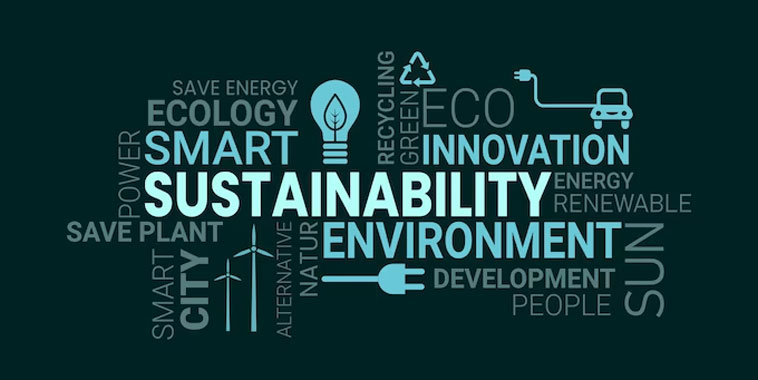
As the primary institution in the ecosystem, the government has a critical role in ensuring that different actors’ resources and efforts are aligned towards achieving the SDGs. As part of the work of our Consortium on SDG-driven tech Innovation Ecosystems, which the GSG co-leads together with National Advisory Board (NAB) partners from Israel, Portugal, France, and Italy, we are looking at reliable data and useful resources that compare the best practices of innovative and sustainable governments.
In this blog, we explore some of the most comprehensive international databases and frameworks that offer valuable information and insights into best practices for innovative and sustainable governments. These resources provide a holistic approach to monitoring and evaluating progress towards achieving the SDGs and promoting accountability in the pursuit of shared goals.
Resources for Innovative Governments
The OECD has a few great resources. Its EC-OECD STIP Compass is a database that collects together in one place qualitative and quantitative data on national trends in science, technology and innovation (STI) policy from OECD member countries, supporting the continuous monitoring and analysis of countries’ STI policies in each country. The database addresses all areas of STI policy, involving initiatives spread across different ministries and national agencies. With STI as the common lens, the STIP Compass database presents data on the following domains:
- Governance
- Public research
- Innovation in firms and innovative entrepreneurship
- Science-industry knowledge transfer and sharing
- Human resources for research and innovation
- Research and innovation for society
- Countering impacts of COVID-19 on STI systems
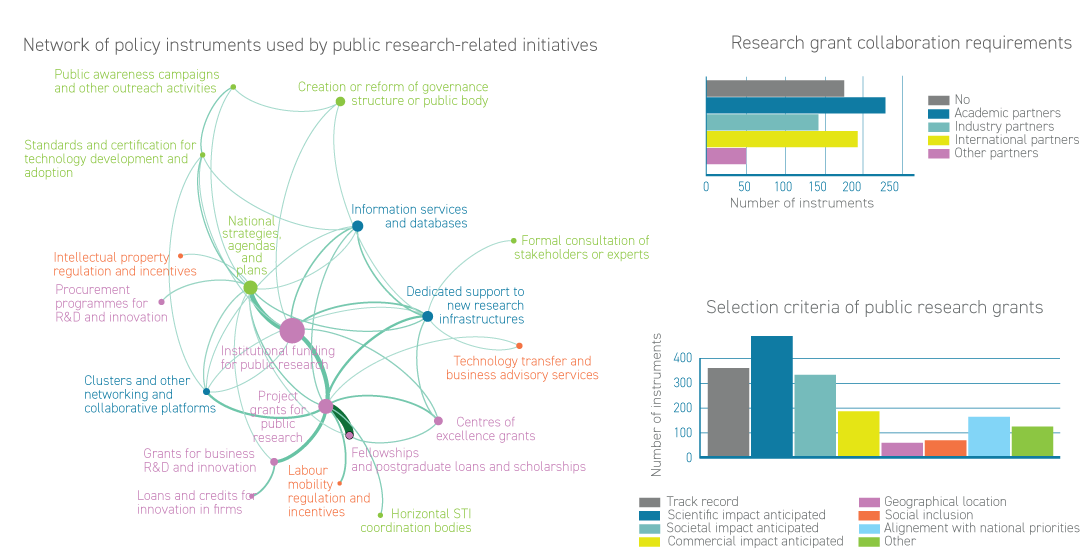
Source: STIP Compass
Moreover, the Observatory of Public Sector Innovation (OPSI), another OECD initiative aims to promote innovation in the public sector, serves as a platform for governments, policymakers, and other stakeholders to exchange knowledge and best practices, and to identify emerging trends and opportunities for innovation. Its Anticipatory Innovation Resources (AIR) helps policy practitioners and experts in public sector innovation get started with anticipatory innovation. Additionally, the Government at a Glance, published every two years by OECD, suggests input indicators on public finance and employment; process indicators on regulatory governance, public procurement, governance of infrastructure, public sector integrity, open government and digital government.
Resources for Sustainable Governments
Sustainable Governance Indicators (SGI) presents a comprehensive framework and dataset to evaluate and compare the performance of countries in the areas of Sustainable Policies, Robust Democracy, and Good Governance. Developed by the Bertelsmann Stiftung Foundation in Germany, the SGI framework covers a range of policy areas, which includes democracy and governance, economic policy, social policy, and environmental policy, providing a set of indicators for each of these areas.
To discover resources for sustainable finance, consider exploring Sustainable Finance Hub, which is a platform developed by the United Nations Development Programme (UNDP) that provides valuable information and tools. Aiming to support countries in aligning their financial systems with the SDGs, the hub explores an overview of sustainable finance activities, which includes 1,055 initiatives across 145 countries, providing guidance and tools for governments, financial institutions, and other stakeholders to mobilise private capital towards sustainable development.
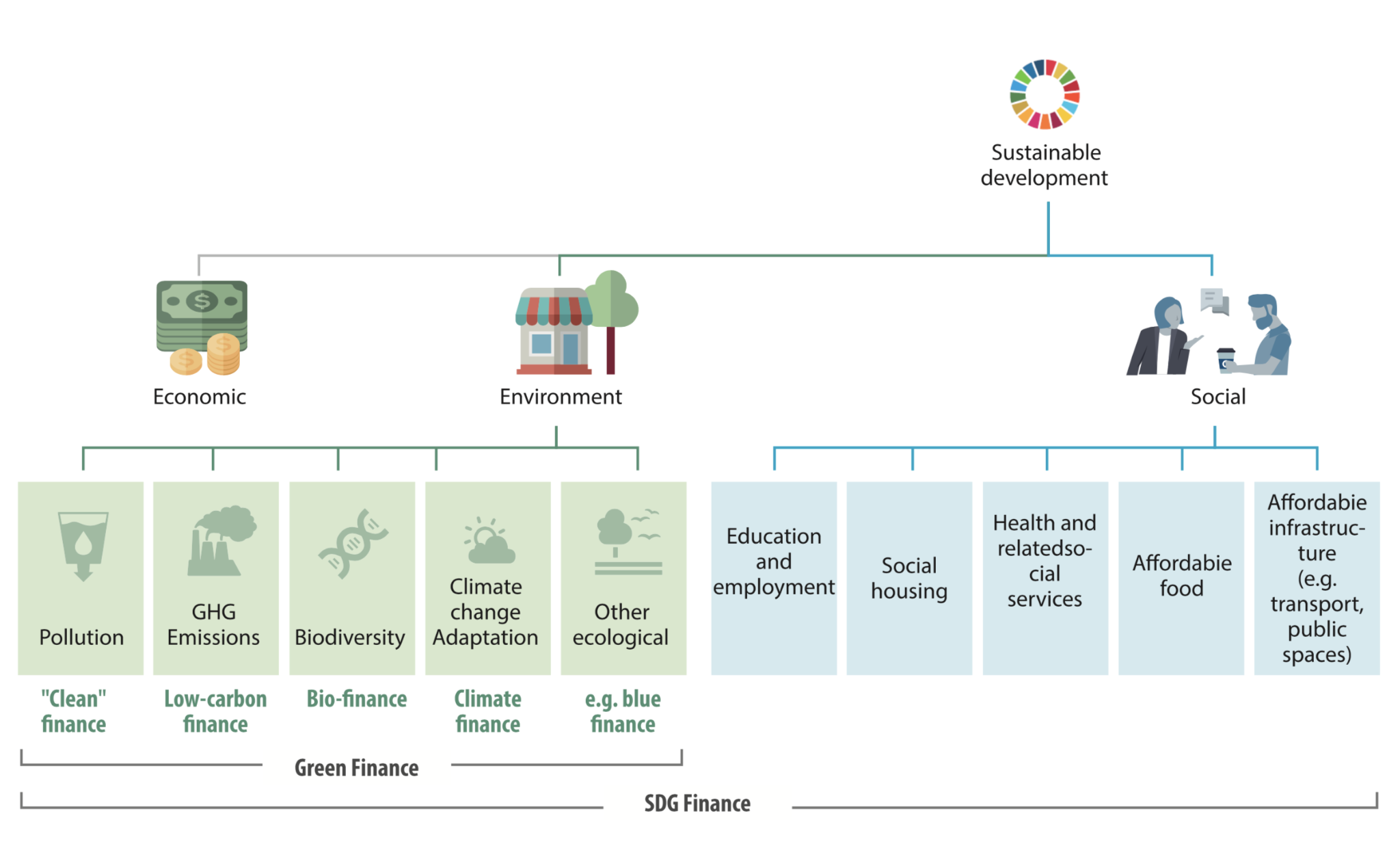
Source: SDG Finance Taxonomy
By utilising the resources and frameworks discussed in this blog, governments can benchmark their progress on innovation and sustainability, assess their policies and performance, identify areas of improvement, and take proactive steps towards achieving the SDGs. This will foster an environment where all actors are committed to advancing shared prosperity, social inclusion, and environmental stewardship, thereby laying the foundation for a robust ecosystem, which GSG and its affiliated NABs are dedicated to achieving.
Which Tech Sectors Align to the SDGs?
The UN Sustainable Development Goals (SDGs) offer a comprehensive framework for addressing global challenges such as poverty, inequality, and climate change. Initially developed as a framework for states and policy makers, measuring the impact of investments aligned with the SDGs has become more common among corporates and institutional investors, but remains challenging for most investors and start-ups.
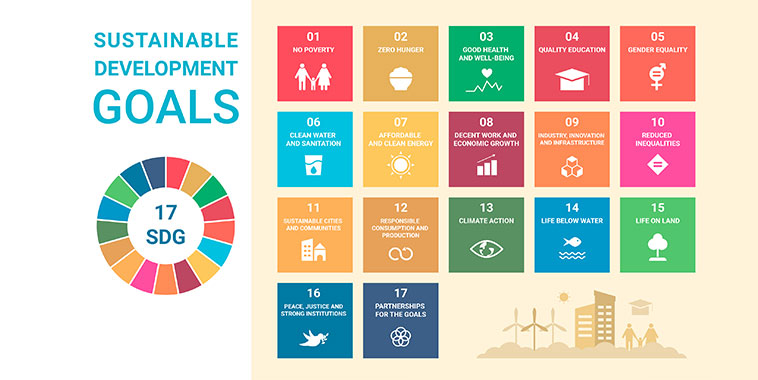
Impact measurement is crucial to track progress and ensure that resources are used effectively, but the process can be complex and time-consuming. Moreover, the lack of literacy and awareness about SDGs among stakeholders exacerbates the issue. Fortunately however, the tide is turning with regard to private sector engagement and accountability to the SDGs. As highlighted in findings from the Consortium on SDG-driven Tech Innovation Ecosystems (expected Q2 2023) which the GSG co-leads together with National Advisory Board (NAB) partners from Israel, Portugal, France, and Italy, there is a growing trend of private sector actors using impact measurement/assessment frameworks. In France for example, 71% of companies have adopted an SDG framework to meet investor expectations and over 50% of institutional investors reported on the SDGs in 2018. Similarly, in Portugal, ~50 major corporations mention the SDGs in their sustainability reports, indicating that these companies incorporate the SDGs when measuring and communicating their impact.
Despite these promising results, the Consortium’s findings also reveal that SDGs are not commonly incorporated into impact measurement and assessment frameworks among most VC investors or startups. While some tools, which GSG profiled in a previous post, are available to help investors and companies align to the SDGs, only a handful reference tech-aligned sectors specifically. This poses a challenge for investors looking to support innovative technologies that can drive SDG progress.
To address this, we have compiled a list of several frameworks and tools that have been developed to clarify which tech applications align with the SDGs.
The following frameworks provide guidance to investors and stakeholders looking specifically to align their tech investments to SDGs:
- SDG Impact: The SDG Impact Standards provide guidance to businesses and investors on embedding sustainability and the SDGs into their management practices. The framework is based on a set of 17 SDG impact statements designed to help investors identify and measure their impact on the SDGs. While the SDG Impact Standards are a comprehensive tool, they do not focus specifically on tech-aligned sectors.
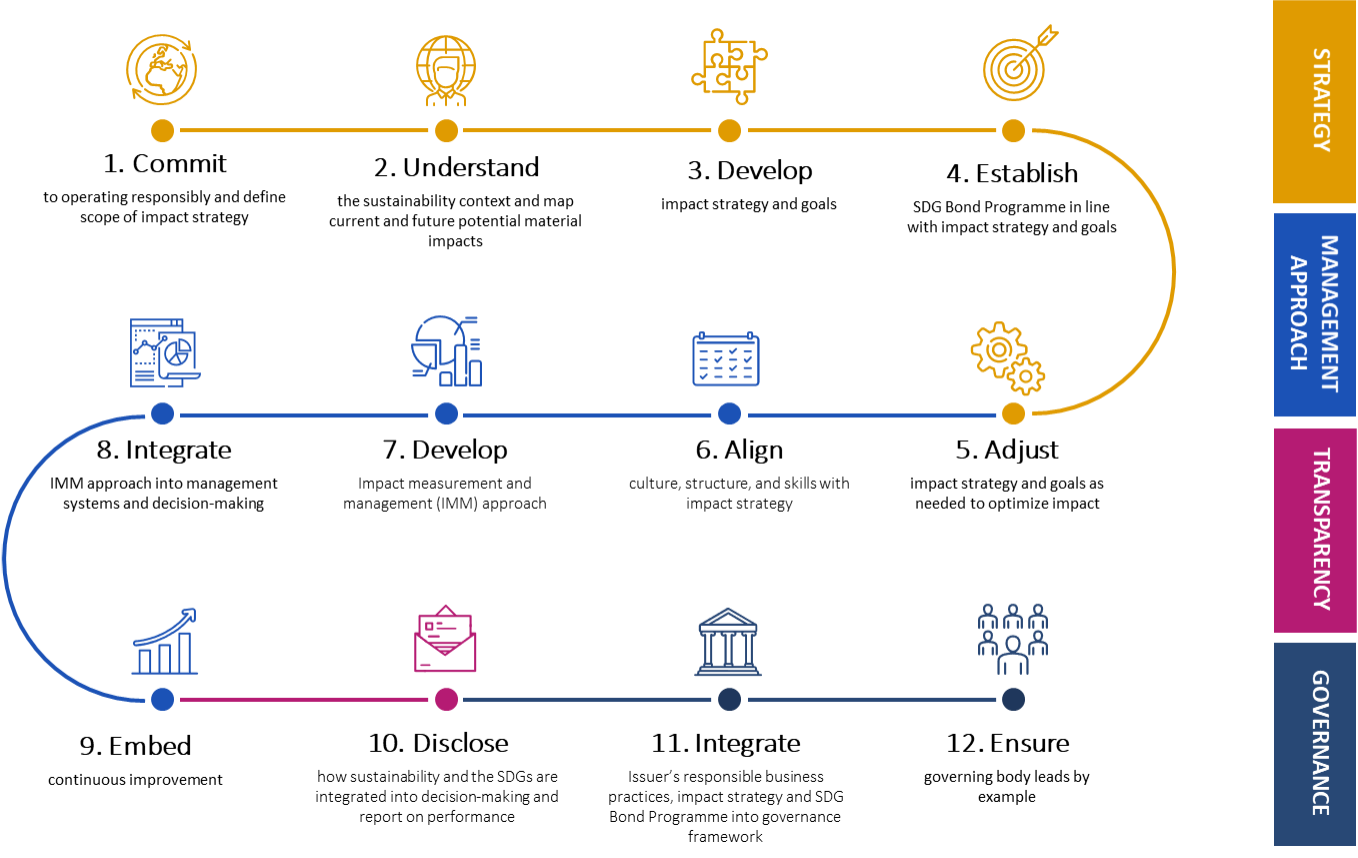
Source: SDGImpact
- EU Taxonomy: The EU Taxonomy is a classification system that identifies environmentally sustainable economic activities. It is designed to help investors identify which investments are aligned with the EU’s climate goals. However, the taxonomy does not include agtech, water tech, or social applications of technology such as edtech, fintech, healthtech, and govtech.
- Planetech Challenge Areas: The Planetech Challenge Areas support organisations in discovering how their technologies can address climate change challenges while gaining economic value. While this framework provides valuable guidance on how technologies can contribute to climate change mitigation, it does not link tech applications to the SDGs.
- Toniic SDG Impact Theme Framework: The Toniic SDG Impact Theme Framework is a taxonomy that matches members with others working on the same impact themes. It is tied to the SDGs and guides investors in aligning their investments with specific impact themes. However, this framework does not reference all possible software applications.
- SDI Taxonomy: The SDI Taxonomy focuses on companies’ product and service-related contributions to the SDGs and is based on financial metrics such as revenues. While this framework provides a clear way to measure the impact of investments, it does not provide guidance on specific tech applications that can drive SDG progress.
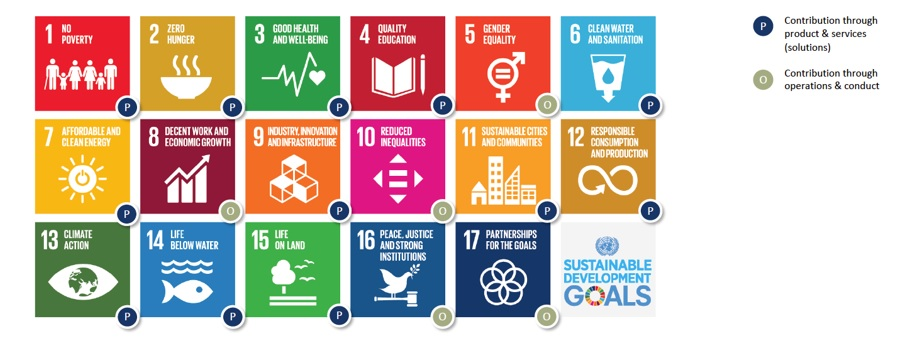
Source: SDI Asset Owner Platform
Even though the above tools and frameworks are not perfect solutions, they provide valuable guidance to investors and stakeholders looking to align their investments with the SDGs. Driving progress towards achieving the SDGs in the private sector, they offer a useful starting point for investors looking to support SDG-driven innovative technologies.
Municipal-level Strategies for SDG-driven Innovation
In April, UN Deputy Secretary-General Amina Mohamed warned that the Sustainable Development Goals (SDGs) are “slipping from our grasp.” With only seven years left to achieve the SDGs, municipalities are at the forefront of efforts to keep the SDGs top of mind in the urban agenda. According to research by the OECD, approximately 105 of the 169 SDG targets – over 60% – will only be reached if local and regional governments are actively engaged, as these governments are responsible for 55% of public investment and 37% of public expenditure across OECD countries. They also have significant sway over policies that are central to sustainable development and people’s well-being – from water to housing, transport, infrastructure, land use and climate change, amongst others. With 2.5 billion more people projected to be living in cities by 2050, action by municipalities today is key in determining the conditions in which many of us will live tomorrow.
A recent mapping study (forthcoming in Q3 2023) conducted by the Consortium on SDG-driven Tech Innovation Ecosystems, which the GSG co-leads together with National Advisory Board (NAB) partners from Israel, Portugal, France, and Italy, highlights a few great examples of municipal initiatives that are contributing to SDG-driven innovation in their respective countries.
This blog feature three examples:
- MIND Milano Innovation District: A geographical cluster for SDG-aligned innovation and economic development (Italy);
- The Open Data Policy for Sustainable Innovation, Vilnius (Lithuania);
- SDGLocal: A municipal platform for the SDGs (Portugal).
As these examples illustrate, public and private partnerships are at the heart of creating sustainable and innovative cities (SDGs 11 & 17). Cities are at their best when they serve as a platform for cross-sector collaboration in pursuit of solutions to local challenges, and as a platform for measurement, knowledge sharing, transparency and accountability.
MIND Milano Innovation District: An ‘innovation geographical cluster’ for SDG-aligned innovation and economic development
‘Innovation geographical clusters’ are government-led initiatives aimed at fostering innovation and economic growth. They are delivered as national and municipal/regional strategies that foster cross-sector partnerships and knowledge transfer among different actors – including corporates, VCs, start-ups, social enterprises, universities, and more. Through these comprehensive strategies, governments provide incentives and opportunities for companies, research institutions, and other supporting organisations to do business and hold activities in specific geographic locations, especially in underdeveloped areas.
The MIND Milano Innovation District in Italy is a great example of an innovation geographical cluster that is focused on developing, commercialising, and scaling solutions in the domains of health-tech (SDG 3), environmental sustainability (SDG 13), digitalisation (SDG 9), and being a city of the future (SDG 11). As part of the legacy of EXPO 2015 in Milan, the Italian government launched the MIND project to create a new district dedicated to innovation and sustainability. Through its partnerships with public and private entities, including universities, research institutes, and multinational corporations, MIND brings together expertise, resources, and funding to support research and development projects in life sciences, data science, and genomics.
Currently, MIND is home to various corporates, start-ups, research labs, mixed-use real estate, garden and garden park space, and hospitals. With both private and public sector investments, the estimated value of MIND stands at €4 billion. With the aim of a city for the environment; well-being; and social impact, the MIND ecosystem generates a physical and digital space for dialogue and inclusion and fosters collaborations between stakeholders in multiple industries.

Source: YesMilano
The Open Data Policy for Sustainable Innovation, Vilnius
Vilnius, the capital city of Lithuania, is a city known for technological and digital innovation and a tech-oriented business ecosystem. With a 2022/23 award for the European Cities of the Future, (a ranking by fDi Intelligence, a specialist division of the Financial Times), the city of Vilnius is working on advancing sustainability and addressing SDG-related local challenges through innovation. It is estimated that around 1.5 million EUR of its overall 5 million EUR annual budget – 30% – tackles SDG-related issues, with specific strategies for digitalisation (SDG 9) and climate-neutral city (SDGs 11 & 13).
But it’s not only Vilnius’ goals and financing that make this city stand out. One of the key facets of the city’s efforts is its commitment to open data that make information about the city more easily accessible. For instance, the city provides an open data portal and a 3D map of the city on a range of topics such as waste management, traffic flows, and property. This has enabled third parties to develop shared mobility solutions and innovative tools for real estate developers, among others, that make life more convenient for the residents of Vilnius while contributing to the establishment of a smart and sustainable city.
SDGLocal: A municipal platform for the SDGs
To foster SDG-driven innovation ecosystems, we need more transparency and accountability around progress toward achieving the SDGs. This is best done through tools and platforms that enable impact measurement management. In this regard, Portugal’s SDGLocal platform serves as a promising model for replication among municipal-level SDG platforms looking to stay accountable to their constituents on one hand, and clear about progress achieved, on the other.
Launched in 2019 as a joint initiative of several institutions, the National Council for Environment and Sustainable Development (CNADS) and the University of Lisbon’s Institute of Social Sciences (OBSERVA), the SDGLocal Platform is an online portal that allows the visualisation and monitoring of the contributions and progress of each municipality in relation to the SDGs. The platform maps over 600 projects and good practices by municipalities, providing information on their progress towards meeting defined targets. The platform has attracted the participation of 28% of Portuguese municipalities. Partners aim to expand the initiative to 120 municipalities, doubling the number of projects and initiatives mapped by the end of 2023.
In addition to platform management, SDGLocal promotes several complementary initiatives, including an annual conference, awards, certification programs, capacity-building and training programs, and support for municipalities in developing local SDG-aligned strategies. The platform provides an opportunity for municipalities to report and communicate effectively on their contribution and progress towards the SDGs and expand partnerships to address local challenges, thus unlocking the potential for local Portuguese communities to contribute to solving global problems.
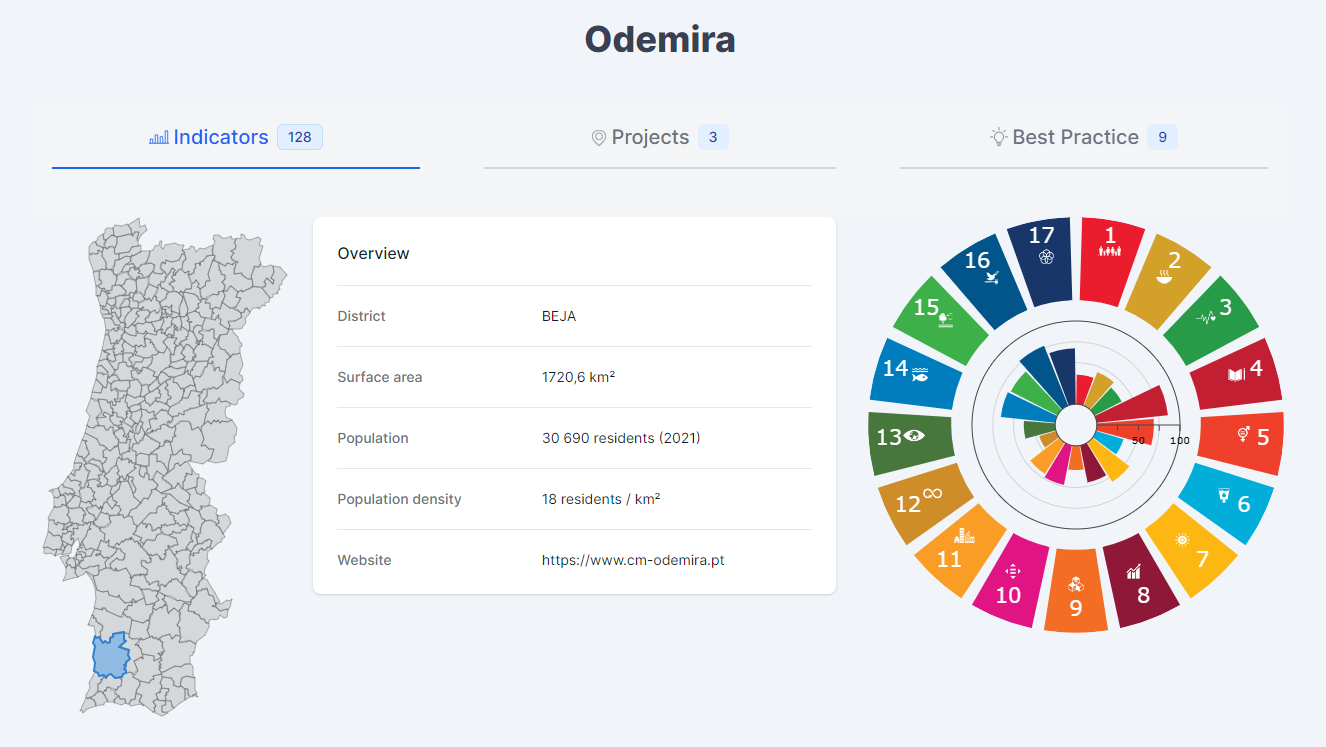
Source: SDGLocal
An Overview of the SDG-Tech Trends
Technical standards are needed to assess tech-based solutions that can play a role in addressing the UN Sustainable Development Goals (SDGs), solutions that can be applied to alleviating poverty, addressing hunger, or mitigating climate change. With technological change paving the way for achievement of the SDGs, new ecosystem research and standards for ethical practices in technology are in the limelight.
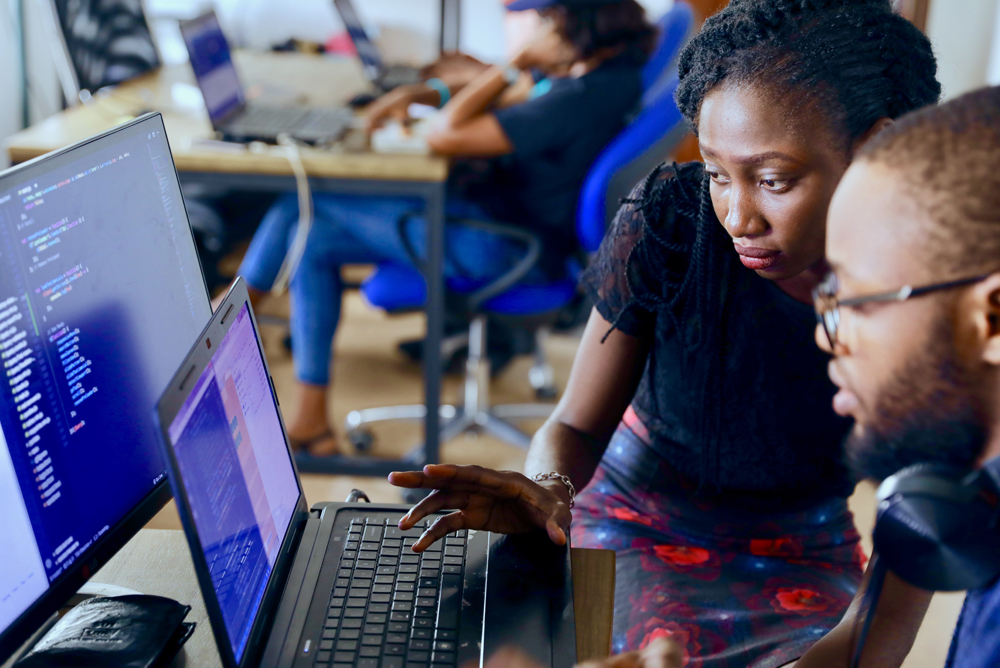
Though applicable to an array of use-cases, most technologies have not been explicitly designed to tackle social and environmental challenges or contribute directly to the SDGs. To help hone use-cases that may be applied to the SDGs, the Institute for Transformative Technologies, has identified the ‘50 most critical scientific and technological breakthroughs’ required for the sustainable development goals.
This blog post introduces how researchers have addressed the ecosystem approach to SDG-tech and presents interesting attempts at establishing standards for ethical and responsible tech.
Research on innovation ecosystems for achieving SDGs
Granstrand and Holgersson (2020) defines innovation ecosystems as “the evolving set of actors, activities, and artefacts, and the institutions and relations, including complementary and substitute relations, that are important for the innovative performance of an actor or a population of actors.” This concept is applied to the ecosystems where multiple actors aim to co-create a systemic and transformative innovation to challenge global problems.
‘Digital social innovation (DSI) ecosystems’ is used by Nesta (2015). DSI ecosystems refer to a space where tech entrepreneurs and innovators in civil society are developing digital solutions to social challenges. Using network analysis which maps around 1000 organisations with more than 6000 collaborative DSI projects, this research classified DSI into four different technological trends: open hardware, open networks, open data, and open knowledge.
The term ‘mission-oriented innovation ecosystems’ is introduced by Jütting (2020), which categorises the typology of ecosystems by its distinct target focus among people, prosperity, and planet. Mission-oriented innovation ecosystems bring together all relevant actors for joint value creation and co-evolution, particularly underlying the role of civil society and research organisations for system-level transformations. The role of public sector and policies were more emphasised by the economist Mariana Mazzucato (2018), who defines the mission-oriented policies as “systemic public policies that draw on frontier knowledge to attain specific goals or big science deployed to meet big problems.”
Elert and Henrekson (2022) points out Mazzucato’s typology on mission-oriented innovation policies mostly rely on an “overly mechanical view of innovation and economic growth.” Instead, he suggests the term ‘collaborative innovation blocs’ on the actors and competencies crucial for “an innovative idea that eventually becomes an efficiently produced and widely disseminated high-quality good or service.”
Ethical practices in technology
Developed by university and sector research employees and research foundation delegates from over the world, the Vienna Manifesto on Digital Humanism is a guide written for digital technologies, encouraging actors to adopt responsible and socially beneficial practices. Released in 2019, the manifesto calls for a Digital Humanism that “describes, analyses, and, most importantly, influences the complex interplay of technology and humankind, for a better society and life, fully respecting universal human rights.”
The Vienna Manifesto concludes with 8 core principles that underscore the social responsibility of tech research:
- Digital technologies should be designed to promote democracy and inclusion.
- Privacy and freedom of expression are essential values for democracy and should be at the centre of our activities.
- Effective regulations, rules and laws, based on a broad public discourse, must be established.
- Regulators need to invoke anti-trust to break tech monopolies.
- Decisions with consequences that have the potential to affect individual or collective human rights must continue to be made by humans.
- Academics and industrial researchers must engage openly with wider society and reflect upon their approaches.
- Practitioners everywhere ought to acknowledge their shared responsibility for the impact of information technologies.
- A vision is needed for new educational curricula, combining knowledge from the humanities, the social sciences, and engineering studies.
Technology is one of the main pillars of SDG 17: Strengthen the means of implementation and revitalize the global partnership for sustainable development. As more research on sustainable technologies and SDG-driven innovation ecosystems is published, ecosystem actors will gain a better idea of the possibilities afforded by SDG-aligned tech, as well as their respective roles in championing practical and effective solutions to today’s most pressing social and environmental challenges.
We look forward to keeping our eye out for more up and coming research on this emerging trend.
Top tools for investors and companies
“How to unlock $12 trillion a year and generate up to 380 million jobs” reads like a billionaire’s investor playbook. Instead, and better yet, it’s the welcome findings of a landmark study issued by the Business and Sustainable Development Commission. $12 trillion per year, effectively 10% of global GDP, represents the economic value of financing innovative solutions to the world’s biggest challenges, in other words, financing solutions that align to the 17 United Nations Sustainable Development Goals.
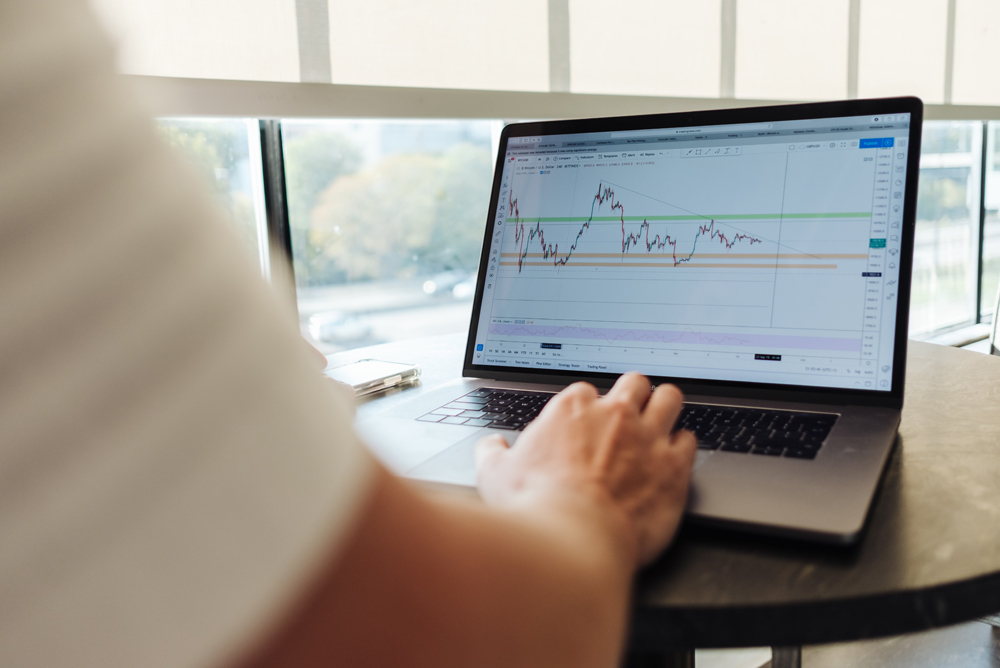
Despite the auspicious findings and the suite of examples of how it can be done, investors have been slow to engage. The blog below presents a roundup of practical resources for investors and companies to use to help get up to speed on how to approach this compelling and timely investment opportunity.
What are SDG-aligned Investments?
Simply put, SDG aligned investments are investments that align with one or more of the UN Sustainable Development Goals (SDGs), and often, one or more of a goal’s underlying targets.
Not so simple, though. The SDGs were initially written as framework for policy makers, not investors. Themes addressed in the SDGs often do not align 1-1 with investment activities, asset classes, and business models that investors might be more familiar with.
A few resources have been developed to bridge this gap and “translate” the goals in to terms that be easier for investors to assimilate.
Featured in Framework for SDG-Aligned Finance, the OECD’s Global Outlook on Financing Sustainable Development 2021 provides an overview of what SDG-aligned investments might mean to different types of private sector actors. For example to investors at Public Development Banks, Central Banks, Sovereign Wealth Funds, Asset managers, commercial and investment banks, pension funds, insurers, rating agencies, stock exchanges, and philanthropies. With the help of this framework, each investor type knows which actions to prioritize in accordance with its respective comparative advantage.
Another resources, the SDG Compass provides guidance for companies on how they can align their strategies as well as measure and manage their contribution to the realization of the SDGs.
Asset owners and asset managers may wish to review the PRI’s Investing with SDG Outcomes, a 5-part framework designed to help investors start applying the language of social and environmental “outcomes” to their investment activities.
Corporates may consider reviewing the GRI’s paper on integrating the SDGs into corporate sustainability reporting. The resource presents sustainable practices as a way for companies to improve transparency and accountability among customers, a must among today’s corporates.
How can investors integrate the SDGs into their investment strategies? Are there platforms for sourcing SDG-aligned investment opportunities? Tools for carrying out due diligence?
Deal Sourcing:
Investors with a global footprint are encouraged to visit the website of the Global Investors for Sustainable Development Alliance (GISD). Their SDG Investment Platform currently lists 468 live SDG deals across the world in a variety of asset classes. The opportunities are backed by robust research produced by the UNDP and released through their investor maps.
VC investors may check out Dealroom.com. In 2019 the platform started building a comprehensive dataset on startups making a positive impact. Today, dealroom’s list of European start ups generating positive impact numbers more than 620 startups They distinguish between core and side SDGs: Core = directly aligned with Social Development Goals (e.g. cleaning the ocean); Side = indirectly aligned with Social Development Goals (e.g. shared mobility).
Pensions may reference the SDI Taxonomy which provides a standardized taxonomy for asset owners looking to invest sustainably.
The Toniic Impact Theme Framework, is a guide for private investors to help them align their investments with the SDGs and thereby find greater alignment and synergy in global investment opportunities.
How do I measure my alignment? Resources for SDG impact measurement and management
To measure the impact of their investments, investors can use IRIS+, a data base of metrics designed for investors looking to achieve measurable outcomes through their investments, or the Impact Management Norms, the best attempt yet at a standardized impact assessment and reporting framework. Both map back to the SDGs in ways that are easy to grasp and work with.
For enterprises may look at BCorp’s SDG Action Manager, which helps businesses set goals, track progress, and stay motivated on specific actions to support the SDGs.
Enterprises, private equity investors, and bond issues should explore the SDG Impact Standards designed specifically for these stakeholder groups.
With SDG-aligned investing still not mandated by regulators, the market is rife with untapped investment opportunities. To help investors more readily explore and consider these opportunities, the frameworks mentioned above will be of good help.
3 Innovations accelerating the energy transition
Technology for SDG 7: Affordable and Clean Energy
Net Zero pledges are on the mind of companies and investors, and one of the best routes to success is for these actors to consider new and innovative technologies. This post outlines three trending technologies – green hydrogen energy, floating solar power, and bioenergy – that tackle the Sustainable Development Goal (SDG) 7: Affordable and Clean Energy, which aims to ensure access to affordable, reliable, sustainable, and modern energy for all. The industry outlook followed by examples of fascinating applications explain why these sustainable technologies are the mainstay of the energy transition.

Green hydrogen energy
Green hydrogen is hydrogen created by renewable energy or from low-carbon power. It is thought of essentially as ‘emissions-free.’ Considered the most abundant material in the universe, research predicts that hydrogen will play a significant role in helping societies meet the world’s future energy demands. PwC predicts a steady growth of green hydrogen demand, which will accelerate from 2035 onward. Hydrogen demand by 2050 is expected to grow even further, depending on global climate ambitions, energy-efficiency measures, direct electrification and the use of carbon-capture technologies.
The International Energy Agency (IEA)’s Global Hydrogen Review 2022 details policy support to drive new and cleaner uses of hydrogen in heavy industry and long-distance transport. It projects that the encouraging developments in hydrogen technologies include an expected six-fold increase by 2025 in global manufacturing capacity of electrolysers, which are necessary to produce low-emissions hydrogen from renewable electricity. Goldman Sachs further projects that green hydrogen would become pivotal to the utilities and energy industries. It analysed that green hydrogen has the potential by 2050 to turn into the largest electricity supplier, with power demand in Europe set to double by 2050.
Turns out there are already some promising innovations already centred around this fuel source. The US startup ElektrikGreen is a residential and commercial hydrogen provider, which created the at-home electric vehicle charging solutions using hydrogen fuel. In another example, Dutch designer Studio Mom and Australian hydrogen fuel startup Lavo launched the world’s first Hydrogen-powered e-bike, designed to take advantage of the higher energy-to-weight ratio offered by hydrogen fuel cells. Airbus’s ZEROe concept aircrafts aims to be the world’s first zero-emission commercial aircraft, powered by hydrogen combustion through modified gas turbine engines. The tech is expected to achieve a mature readiness level by 2025.
Floating solar power
Floating solar or floating photovoltaic (FPV) are solar panels mounted on a body of water. Compared to traditional ground-mounted and rooftop solar, the floating solar power system has a significant benefit in that it does not take up valuable space on land. The World Bank’s report analysing the floating solar market highlights that floating solar technology is paving the way for significant global expansion of solar energy use, especially in densely populated and land-constrained countries. The report estimates the global potential of floating solar to be 400 GW, approximately equal to the total capacity of all solar PV installations worldwide at the end of 2017.
Not only is its benefit maximising land usage, an analysis on the FPV by the International Finance Corporation (IFC) also points out that another significant benefit of floating solar is that bodies of water exert a cooling effect, which improves the performance of solar PV panels by 5–10%. It predicts the potential for further growth in floating solar PV power would be significant, particularly emphasising the promising results of combining hydropower generation with floating solar panels.
Floating solar is rising as a popular renewable energy system particularly among small island nations which are acutely threatened by climate change, especially increases in sea level. Swimsol is a solar power system provider in the Maldives, which launched the world’s first floating solar solution for the sea. Partnering with LUX* South Ari Atoll, a luxury resort in the Maldives, Swimsol installed the world’s largest floating solar system to power the resort with solar energy. With the technology still proving to be quite capital intensive, t development finance institutions (DFIs) have been leading the charge in financing floating solar projects he European Bank for Reconstruction and Development (EBRD) supported 12.9 MW floating solar PV farm in Albania, and the Asian Development Bank (ADB) provided a $37 million loan to provide a large-scale floating solar PV in Vietnam.
Bioenergy
Bioenergy refers to electricity and gas that is generated from organic material that makes up plants, known as biomass. According to the IEA, modern bioenergy is the largest source of renewable energy globally, accounting for 55% of renewable energy, which shows its promising role in the energy transition. According to the Agency, we should expect to see an increase this year in projects featuring new methods of converting biological matter into energy, as well as practical applications.
To scale up the deployment of key bioenergy applications, a report, published by the International Renewable Energy Agency (IRENA), highlights the significance of a policy framework that includes sustainability-based target setting and long-term planning and cross-sector coordination for bioenergy. he IFC’s guide for developers and investors describes the necessary steps in the development of a biomass-to-energy project. It’s a practical tool to assess the technical and financial feasibility of the different biomass-to-energy options.
How is the technology already being applied? A great example of bioenergy use is Heineken Cambodia, which launched the country’s largest biomass plant in Phnom Penh for its brewery operations. The plant can generate 11 megawatts thermal (MWth) power and uses 45 tonnes of rice husks a day for the purpose, contributing to Heineken’s goal of achieving net zero emissions by 2030 in their production facilities. Another example of a project led by the Baltic Sea Action Group plans to convert toilet waste water discharged from cargo ships into biogas fuel for heavy transport, preventing decrease of the nutrient load on the sea.
SDG-compliant technologies provide innovative solutions to many challenges we face today. Here’s to hoping that these pioneering technologies continue to scale, leading the way for a sustainable energy transition!

SDG NEWSLETTER #1 – JANUARY 2023
We’re thrilled to be kicking off a two-year project looking at SDG-driven innovation ecosystems, looking at what programmes exist, and what gaps still need to be addressed. Backed by a grant from the EU’s Horizon 2020 programme, partners in this project include IFIE (the Israel NAB), FAIR (French NAB), Social Impact Per L’Italia (Italy NAB) and MAZE (Portuguese NAB).
After three months of mapping their local ecosystems, NABs are putting the final touches on their SDG Innovation country reports. We are eager to receive their submissions which will be used to compile a synthesis report of opportunities and barriers across all four countries. To fill in data gaps, they’ve held events with leading stakeholders. Several of these events are detailed below. It’s great to see the project take shape and the breadth of energy and ideas being shared and exchanged.
FAIR (French NAB)
The NAB has engaged with a multiplicity of stakeholders in the social and technology innovation ecosystem, including 4 public actors, 2 researchers, 7 private sector actors, and 3 social sector organizations.
At an event organised alongside “Mouvement Impact France”, a collective representing the actors of the social impact economy in France, the NAB convened a session called, Startup funding crisis: an opportunity for tech for good? Crise du financement des startups : une opportunité pour la tech for good?
Attendees met at Morning Auber, a co-working space in the center of Paris, to discuss the latest developments in tech financing and understand what initiatives could help advance a more impactful innovation ecosystem.
Speakers included:
-
- Eva SADOUN (co-founder of Lita, a fundraiser for social impact companies’ project);
- Antoine MICHEL (Partner at Investir&+, long-term investment structure for social impact companies’)
- Clara CHAPPAZ (Director of La French Tech, a network of start-ups bolstered by the government)
- Frédérick MAZZELLA (founder of BlablaCar, a car-sharing unicorn)
- Olivier JEANNEL (founder of Roger Voice, application dedicated to help people who are hard of hearing have a phone conversation)

A questionnaire was shared among participants prior to the event to enrich the data collected for study. Around 30% of participants provided their thoughts on best practices and obstacles, as well as ideas for the French ecosystem.
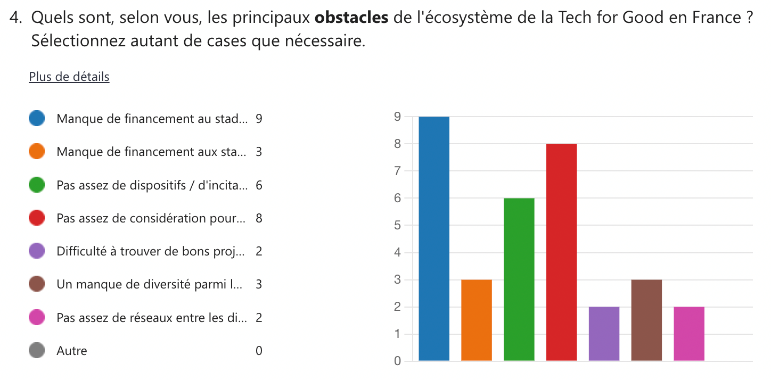
IFIE (Israeli NAB)
IFIE hosted Israel’s NAB board for a full day workshop in Tel Aviv in December 2022, dedicated to outlining its 2030 impact economy and SDG driven vision for Israel. 30 professionals from Israel’s NAB board, including investors, consultants, ESG experts, policy makers, participated in this engagement event.
The event addressed visions, challenges, and priorities for Israel’s social and technology innovation ecosystem through the lenses of: capital demand, capital supply, policy, impact measurement & awareness. IFIE is currently working on combining the insights and recommendations shared at the event into a full strategy for the creation of an impact and SDG-oriented economy, which includes the following agendas:
-
- how to support innovative tech ventures to increase their potential to address diverse SDGs;
- how to shift more capital to invest in SDG-driven tech companies; and
- how to create better cross sectoral partnerships to advance SDG tech innovation ecosystems.
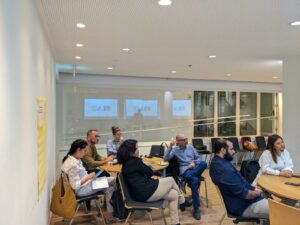
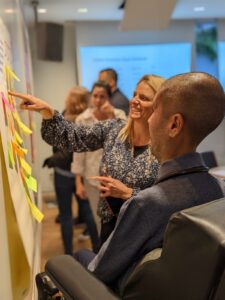
In November 2022, Israel’s AgriFood Week featured FoodTechIL drawing 1,700 attendees from Israel, Asia, Europe and America and organised a FoodTech Expo with over 75 Israeli startups.
“We love being named as one of the 40 companies worldwide that is driving positive change and impact for good!” (It’s July, winner of the 2022 World Summit Award in Israel)
As the national representative of the in Israel, IFIE had the exciting role of nominating SDG focused startups for the WSA, the World Summit Awards. One of the Israeli nominees – It’s July – was selected as a winner in the Culture & Tourism category, a business that enables families to make empowered connections with like-minded families. “We are super honored to be among the WSA winners for 2022!” (- It’s July)
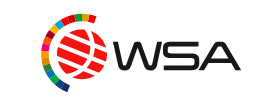


Social Impact Per L’Italia (Italian NAB)
Social Impact Per L’Italia has been hard at work analyzing how sustainability agendas are carried out by different stakeholders through interviews and secondary data analysis. The NAB is gearing up to launch a survey to more than 100 individuals, assessing the most relevant policies, networks, and resources in Italy for championing SDG-driven tech innovation.
With participation from more than 70 (!) actors in the Italian impact investing ecosystem, the NAB held a webinar series geared at empowering impact investing ecosystem actors to be better suited to tackling global challenges, improving knowledge and awareness of impact investing concepts and instruments, and spreading the most adequate impact measurement and management practices. The two events, SIA Dialogues delivered as part of the research project “Impact investing: Transforming finance for a real change”, under the coordination of SIA: Sustainable and financeable business model; and the Impact measurement and management: methods and standards, were held in November and December 2022, respectively. The NAB is currently preparing the last event of the series, Development policies and incentives for impact investing, which will be held on 17 January 2023.
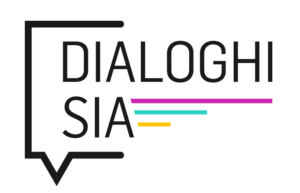
MAZE (Portuguese NAB)
MAZE has successfully completed interviewing ecosystem experts and has found intriguing and important trends in the Portuguese SDG-driven Innovation Ecosystem.
As part of the engagement event, an expert consultation was held in December 2022 at the MAZE Impact headquarters, providing content for the mapping study on best practices and barriers.
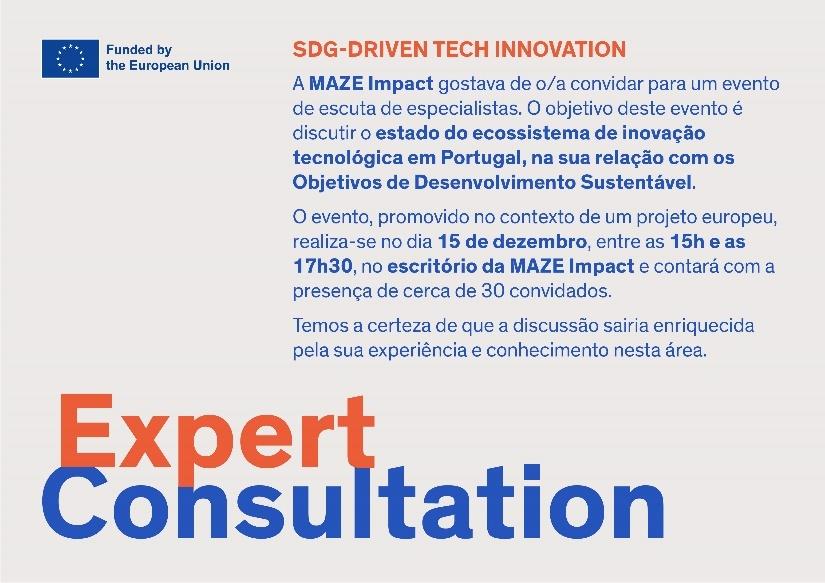 MAZE Engagement Event Invitation December 15, 2022
MAZE Engagement Event Invitation December 15, 2022
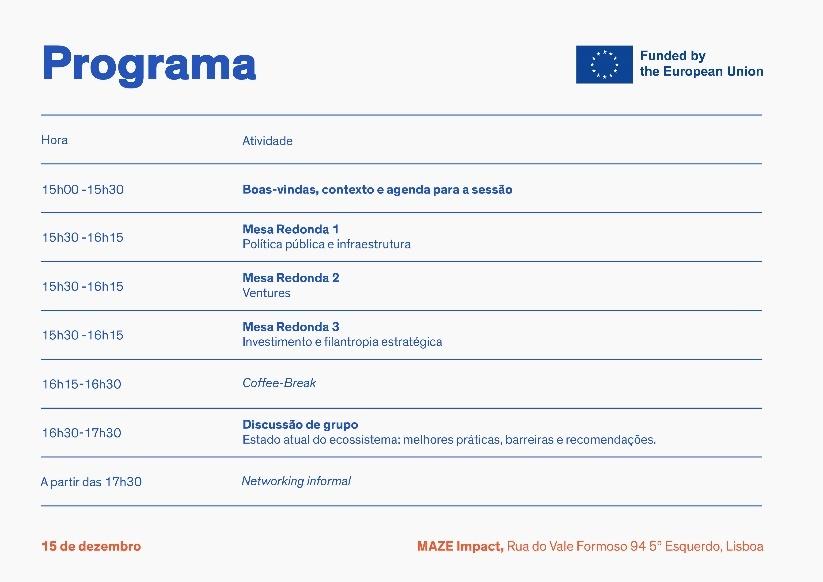
MAZE Engagement Event Programme December 15, 2022
Earlier in the year, in October 2022, the NAB launched the 2030 Agenda for Impact which includes 14 recommendations that lay out the strategy for social investment and innovation for Portugal, comprising over 40 organisations across the public, private, and social sectors.
At the same time, the VI Social Innovation Forum took place in Porto, and the latest edition of the Blue Bio Value Acceleration Program was carried out between September and November for start-ups in the blue biotechnology sector.

